#i would also say with his costume and the way he acts hes definitely portrayed as genderqueer or gender nonconformin
Explore tagged Tumblr posts
Text
Sorta drives me crazy when people say that Electra is "canonically genderfluid" because like. Genuinely where are you people getting that from???
#stex#starlight express#electra the electric engine#people also say that hes canonically bisexual but hes also literally not#i would say hes HEAVILY IMPLIED to be bisexual#i would also say with his costume and the way he acts hes definitely portrayed as genderqueer or gender nonconformin#but to say hes Canonically genderfluid is a bit of a stretch to me. literally at no point does the show treat him as such#its a perfectly valid headcanon!!!!!! but dont give the show that much credit
31 notes
·
View notes
Text
Taskmaster Series 18
First thing I have to say is that it was mildly weird seeing Andy Zaltzman on TV, I'm so used to just hearing him on the radio. Jack Dee and Rosie Jones have definitely become one of my favourite teams from Taskmaster - there's such a contrast between how they portray themselves. It was an absolute delight to see Rosie break Jack, and to see the natural affection between them. Emma and Baba were both new to me, but they were such nice surprises. Andy leaving his hotdog until the last task was perfect, especially seeing as it was all or nothing.
Top 3 tasks
Make the strongest smell. You must seal your smell in this jar and the Taskmaster will open it in the studio.
I knew this was going to be a great task anyway, but the fact that they had to smell their smell first was such a good addition. It does make me sad how anticlimactic Rosies was. It seemed so psychotic, and by looking at it, it should smell foul if it hadn't been sealed in the container. I don't quite get why Andy grated a bit of his boot into it, like he was adding seasoning to it. But the reaction by even the other contestants to his smell rocketed this task to one of my favourites. It's the reaction Rosies should have got if things had gone her way. The fact that there had to be a warning before opening Jack's. To quote Greg - "It's like my nan has come back to life". I felt like I could almost taste the strength of the smell through the TV.
Create, handle and voice the most charismatic new children's television puppet sidekick for Alex.
Rosie shamelessly plugging her book was so in character. Why does it not surprise me that hers was disgusting? Good excuse to mess with Alex by getting the chocolate(?) on him, just anything to mess with him. Jack was taking this chance for a bit of a lie down. Extra points from me for trying to get Alex to say the C word (which lead to a kiss Greg). Of course Andys is completely unhinged. I would have loved to hear the song "you can't eat an ice cream when you're burning in hell". Pecking Alex on the head. Why did Emma's give 'Don't hug me I'm scared' vibes? It started so innocent and happy, but then he just...died! Why did Babas feel like a blue Peter infomercial gone wrong?
Present the goose
Baba went into this task absolutely raging. Which was why his low effort attempt was so great. Giving it his all with his acting in his speech to Greg. The goose costume Rosie got Alex in wad surprisingly brilliant. Getting him to many too eas the perfect 'humiliate Alex' task. Rosie saying "I am happy" whilst looking the least happy she has been the entire series was perfect. Andy going all Attenborough. Why was it angry, from shouting at the geese coincidentally flying over, to absolutely lobbing the ball-egg. And what's Taskmaster without a sex scene reenactment? Jack thinking outside of the box, and not going for a typical goose. Also nice to see his special glasses making another appearance. Going from the SFX flying to Jack plodding around the lawn was top notch Taskmaster. Emma and Alex acting as a Eastenders style mother and son was a good take on the task. I'd love to see a full length play of it. "It's not funny, but that's theatre"
Contestants
Rosie
Baba
Jack
Emma
Andy
(Absolutely no disrespect to any of them on that ranking, I love them all)
#Taskmaster#Taskmaster Series 18#Andy Zaltzman#Babatunde Aleshe#Emma Sidi#Jack Dee#Rosie Jones#Taskmaster Spoilers#Spoilers
10 notes
·
View notes
Text
lgief rewatch eps. 4-5
okay, this is definitely the final in my little triology of posts here. i shared ep. 4 here and most of ep 5. here but tumblr has a photo limit and i cant speak without my visuals! and i wont make gifs, i want stills. so this is the last big post for ep. 5~









STARTING OFF STRONG WITH THE BEST SCENE. oh, you guys dont even know how many times i replayed this on my FIRST watch. 10 times? 15 times? way more than necessary. whoever directed this deserves every award possible. i mean, COME ON.
she's desperately looking for her dad, in an absolute fire hazard of a costume, and who grabs her to save her? MU SHENG!!! the way he grips her arm and stares so intensely. oh my gosh, i could not believe this was 0%. 0%? HOW IS THIS ZERO PERCENT? and i wont dive much into it here but when i read this post about yaos it made me totally think his 0% has to be much different than what humans would feel at 0%. (my friend also said his measured in celsius instead of fahrenheit.)






"are you out of your mind?" YEAH. SHE IS. logically she should've caught on fire and had to backflip into the river like one of the guards.
going as far as to beg him to help her, even knowing he planned on doing something to get her dad punished for justice, grasping him and pleading, meanwhile hes looking at her like she's crazy.





he looks just as hot as the scene around him... jesus.
and the way he sees how frantic she looks and forcibly turning her around, hands on her shoulders. oh we're in deep, arent we?
i wont include it, but then her saying "why is it full?" and him looking away, i think he had the same question too, but i wonder if he felt weird because even she was questioning it...


sorry, the way he sneaks up here... gosh he has NO bad angles. and then confronts him about why he seems disappointed, ugh, we love a justice-seeking baddie.
moving on to much later, as even though we had some physical contact between the two from here with her stopping him from destroying all of the funds her dad used, i dont know if i have that much to say! i mean, him and fuyi having a tense moment with the crates was symbolic of their relationship, ill mention.


his head tilt... so cute... and miaomiao looks extra adorbs too. i know we compare him to a cat a lot but this was very puppy-like of him.


wiping his hands after burning the fake accounting book and acting like it was nothing when she stares at him. uh huh, sure, it was just for justice, totally.




oh please, her calling him out on being a softie... you got him down already, cause he really is! acting so tough because he suspects her, but lets be real, you cant hate her now that you know her. again, knowing when shes looking, and asking "what are you looking at" as if he doesnt know!!! this whole scene i couldnt help myself but say "tsundere, smh"
and even after saying "this isnt over since you stole my precious sisters snack from me" hes STILL just baaaaarely got a smile on his face... yes, the percentage changes next ep back to negative but... he was already falling here, lets not get it twisted.
would you believe i still hit photo limit? sigh... life as a shipper is so hard. i love these two. i might keep doing this, not because i have any true analysis of anything deep (though i could), but simply because i love how ding yuxi portrays ziqi, and how esther yu portrays miaomiao. they sold it so well, where every expression and movement matters, and you can see the characters (mostly ziqi) changing based off how they react. oh its so good...
#lgief#lgef#love game in eastern fantasy#yyxh#yong ye xing he#永夜星河#the guide to capturing a black lotus#guide to capturing a black lotus#cdrama#lgief rewatch#my postings
12 notes
·
View notes
Text
Redesigning Gotham's Riddler
Note: This is intended to be part one of a series I have, one of my special interests is fashion/costume design and the other is superhero media. So this will be fun. Also, I don't have any negative feelings towards Riddler's costuming! His was one of the best in the whole series and the costume designers on the creative team made some excellent choices! This is not to say they did a bad job!
Introduction: So, I dislike a lot of costuming choices in Gotham seasons 1-4. I believe that a story can be portrayed very easily through the costume design, so here's what I'd do if I was in charge.
Season 1: I don't have much to say here. He's still in his beginning phases, but I have a few notes!
Him having some question mark cufflinks or dark green cufflinks could've had some subtle hints towards his villainous future. I know that he has question mark socks but due to the weird lighting of the show, they're not that visible in most scenes.
Season 2: Only a couple notes.
That scene where he kills Tom? I think the jacket should have hints of green. I don't know, I just think that him wearing a red plaid jacket is... weird.
Then afterwards, more green ties and notes of green in his general outfit choices.
He's got that green sweater when he's out of Arkham, which is subtle enough. Like I said, his wardrobe is definitely my favourite out of any rogue on the show.
Season 3: Okay, some notes. Man, his hair... I don't like it. The hair was becoming way more chilled out by season 2, like his newfound freedom from the GCPD and now... back to the weird combed back, gelled hair. It can still be managed by hairspray at this phase of his life, but not where it's basically solid.
What happened to the green? It's very subtle in the first half of the season (pre-breakup) with his suit, which does work for his new job as Oswald's confidante. I would've liked some hints of purple, as a reference to both Oswald AND the normal Riddler colours. In the tie, the lining of the suit, or even the cufflinks.
Late season 3 Riddler has a good costume, classy and still loud. Getting rid of any hints of purple would be good, if they had hints of purple earlier.
Season 4: A lot of notes.
Pre-Riddle Factory was alright. He was messy, dishevelled, and dumb.
During the Riddle Factory, on the other hand... He should've been camped up. He acts as a game show announcer! He needs the drama of it all! The hints of a gold staff, some question marks on his tie, and a new bowler hat! The hat could have a ribbon of bright green, matching the suit.
Season 5: Give the man a haircut, I beg of you.
I really like the journey he has with all... 4? Of his new outfits. They're new, with small details. Once he reunites with Oswald, he should have a bit more purple, but his purple tie was a nice detail.
The finale: GIVE HIM THE QUESTION MARK CANE. PLEASE?
I like the purple gloves and tie, the dark green ribbon on the hat, it's really nice overall! Maybe more saturated, to match Oswald's high saturated finale outfit?
(On another note, here's the image that inspired this post:)

#gotham#gotham ed#gotham riddler#gotham ed nygma#ed nygma#edward nygma#ed nigma#edward nigma#the riddler#riddler#gotham tv#gotham fox#gotham 2014#silly gay rambles#fashion#style#riddler clothing
13 notes
·
View notes
Text
Here's part 2

You are here with Zalando, one of the biggest fashion companies. Are you into fashion?
Yes, I would definitely say that I am. Clothes are a cool way to express yourself. Mostly I'm fascinated by designers that are creative with patterns and colours. The craft impresses me. It's a great interest that doesn't take alot of energy. I've shopped alot at Zalando.

Besides Zalando another International Giant chose to acknowledge Edvin. Every year American Forbes magazine, nominates the 30 most promising people that are under 30 years old and this year Edvin was nominated as the only swede.
I was on the set of Young Royals when I got the news. They were rearranging set and I had a few minutes so I went outside in the sun. When i checked my phone I had gotten an email. "Congratulations you've been featured on Forbes 30 under 30 list" By then it was already out in the media.
I've still not grasped it. It's insane and a huge honour.

We walk pass photo model Emily Ratajokowski when we sit down in the hotel garden a safehaven where producers and investors meet over a glass of Bellini.
Just like with the Paparazzis it's difficult to keep the birds away. Therefore the hotel has hired guards with trained falcons that chase the seagulls away.
Edvin orders a coke Zero. Despite his young age he's already starred in 30 productions. He debuted at 5 in the movie "mannen under trappan" and has been seen in a number of successful tv series such as Gåsmamman and Älska mig.

When I was 5 it was just for fun. I always dressed in different costumes like Spiderman and Jack Sparrow. Then I got the opportunity to act for real. But the playful feeling has always been there. I'm so greatful for the experience I have.

In 2021, Edvin got famous all around the world as prince Wilhelm in the netflix series young royals where a prince starts a forbidden romance with fellow student Simon, played by Omar Rudberg. Their romance ignites a stormy love drama about sexuality and class. The first season produced by Nexiko, immediately became a global success when it premiered last summer, despite being in swedish.
Just like Squid Game Borgen and Snabba Cash it became a hit internationally.

I think young royals became so popular because we were so honest and truthful with our story. We dared to really go there and let the curiosity guide us. I think that shined through and pulled people in. Just like with other Scandinavian shows, young royals has been successful in Latin America.
Why do you think that is?
I don't know. There seems to be some kind of connection between Latin America and Sweden. If it's because our Queen is half Brazilian or because Omar is Venezuelan I don't know. The LGBTQ+ climate is also very different in Sweden compared to Latin America. I think it might feel liberating to see how we portray that. And I also think the monarchy in itself feels very exotic.
22 notes
·
View notes
Note
I saw the ask about having the person feeling like that the Loki show is objectively bad. I liked the show, here is why.
I love Loki, and I love the MCU, but I don’t go into any of it expecting consistency. Tony and Loki are my favourite.
Tony goes through character development in his own movies, IM3 especially that main canon just kinda ignores. So I didn’t go into work he Loki show expecting them to get him consistent or right. I just went in prepared to enjoy the show for what it is in isolation. I also know that no one looks at the stories they write for the MCU critically, so I try and turn off that for a first time watch.
I really like the show, that doesn’t mean I think they made it consistent or in character for Loki. I get why people don’t like it.
I really like the TVA and all the concepts it introduced. I really liked seeing Tom acting his heart out. And I really like Loki/Sylvie because I find something very compelling about a character who hates themselves, meeting another version of themselves and being able to love them. It is not a ship I’m going to write fic about but I like them within the show.
Basically what I am saying is that I go into MCU media with the expectation they will mess up at least one character or plot point badly every time. I like the media for what it is, and I appreciate whatever it brings to the table that I can then cannibalise into da works.
Yeah that's fair. Everyone has a right to their own opinion. Fandom is better when there are a diversity of opinions and we can all respect each other and engage in open and good faith discussion rather than attacking people for having the "wrong" views or trying to harass them out of fandom.
For me personally I feel like the show fails on 3 fronts.
1) To me it fails as a Loki show. I really enjoy Loki as a character and I wanted a show about him. And I didn't personally see him in the show at all. I saw a completely different character who does not behave, speak, act, respond, react, stand, emote, or make choices like Loki does. He doesn't even LOOK like Loki because they did his hair and makeup wrong. And that's really what I wanted. I didn't want Larry (as I call the show character). I wanted Loki. That was what was advertised and to me he was so ooc that he was unrecognizable. If I just saw a clip out of context and didn't know what it was from I would have assumed I was seeing Tom in a totally different role.
Thor Ragnarok felt like a different take on Loki that definitely retconned some of his personality and history, but still felt like an alternate interpretation of the same character in the sense that I could recognize the character as Loki (albeit a different version of him); some people liked that, other didn't. But here it wasn't that. It just felt like a completely new (and to me far less interesting and compelling) character. And beyond that it felt like the show went out of its way to make a mockery of the character played by Tom and by extension anyone who ever cared about Loki's character. Like it felt like a mean spirited caricatured parody. Loki is also extremely sidelined in what is supposed to be his own show. And it most certainly didn't feel like a show about Loki, which is what I wanted. So for me the show didn't provide what I was looking for.
2) To me it also fails on its own merits. If I view it in isolation without comparing it to previous canon and just view it as its own thing it also fails. The quality of the dialogue felt very poor. None of the humor made me laugh and it all felt very juvenile and forced. The plotting and characterization seemed nonsensical and all over the place. Like Sylvie sets off those charges and the episode ends on a cliffhanger with that but then it's never addressed later.
The reason that Loki and Syvie allegedly falling in love breaks the timeline didn't really make sense. Sylvie is going around murdering timekeepers and yet Mobius somehow immediately like and trusts her and says he prefers her to Loki. Loki and Sylvie are simultaneously presented as the same person and also totally different people. Loki allegedly learns self love but we never see that - we see him call himself degrading things like pathetic. And we see him think that Sylvie is better than him. That doesn't seem like self love. The romance feels extremely rushed and unrealistic and awkward and we aren't given a compelling reason for why they are in love or what they even have in common. Sylvie doesn't really have much of a character. Mobius and Loki don't interact much and Mobius consistently mistreats him but Loki somehow thinks of him as a friend. Mobius is portrayed as a good guy for cheerfully carrying out the TVA's ends but Kang is a villain for creating the TVA. The TVA seems to be all made up of humans even though it's in charge of all reality.
If Loki did bad things, then the TVA did worse things and thus are not moral authorities. If the TVA’s actions are acceptable then so are Loki’s. If Loki was wrong to violently impose his will on a planet (let’s forget about the context with Thanos for a minute) then the TVA is wrong to violently impose its will on all of reality in order to eliminate free will. If Loki was wrong to kill a few people, then the TVA was certainly wrong to kill trillions. And thus neither Mobius nor the TVA are moral authorities when it comes to Loki because they are infinitely worse. If the actions that Mobius and the TVA took are acceptable, then there is no reason to criticize Loki because he did far less than them. Etc etc etc.
The cinematography is also very poor and unprofessional and the costumes look extremely cheap and unprofessional. The whole story feels confused and disjointed. The directing is bad because the actors are all very capable but the performances often feel wooden and forced and fake. And the pacing is terrible. A lot of it drags and then plot twists come out of nowhere with no setup so it just makes them feel jarring rather than earned or entertaining.
3) To me it also fails on a moral front. The show contains a lot of problematic depictions and messages and promotes messages that are offensive or even downright harmful.
Mobius gleefully subjects Loki to physical torture by leaving him to be repeatedly beaten in the genital area. This is a very clearcut and straight forward example of physical torture. And Mobius feels no compassion for Loki or remorse over what he has done to him. If anything he seems to find it amusing. And certainly the audience is supposed to find it amusing (which is gross and harmful messaging on Disney’s part). He also subjects Loki to psychological torture. This is a fact. There are multiple instances in the show where the TVA and Mobius subject Loki to treatment that would meet the legal definition of torture under both US law and international law. Furthermore, Mobius and the TVA are holding Loki against his will and forcing him to labor without compensation or any hope of release because they view him as belonging to a group of people (Variants) that they view as inferior and not really people. That’s a pretty textbook case of slavery. So objectively Mobius is Loki’s jailer, torturer, captor, and enslaver. And yet Mobius is presented as justified in what he does to Loki. The writer and director have even called it therapy. And a result many people have parroted this which is very harmful.
The queer “representation” feels straight out of bigoted propaganda. Loki’s personality traits have been retconned to map onto harmful stereotypes about queer men. He is overly expressive, makes grand gestures, is flamboyant, cowardly, dishonest, weak, bad at fighting, lazy, spineless, meek, unused to exercise etc. Now a person could be all these things and also happen to be queer. However, Loki was never like this before. His character was retconned to be this way only in this series where he is confirmed to be queer.
Furthermore, the entire premise of the series seems to be that it is funny and entertaining and justified when Loki is dehumanized, mocked, humiliated, hurt, tortured, beaten, assaulted, and/or robbed of his dignity. That’s the premise. That’s the whole show.
In addition to pro torture and pro authoritarianism and pro victim blaming messaging the show also has problematic depictions of black characters (see here and here), Asian people (see here) and also has a lot of fludphobia and transphobia issues. And much more.
@nikkoliferous has put together a great compendium here of various posts explaining the various issues with the show if you're curious about why some people disliked it.
78 notes
·
View notes
Text
things the netflix shadow and bone got right and wrong—my reaction to the show (🚨 contains spoilers, pls read at your own risk!!)
- to start on a positive note! the shadow and bone characters: i, like many others, didn’t care too much for shadow and bone with the exception of nikolai and am also half convinced a different person wrote soc judging by how little i enjoyed reading s&b compared to soc and crooked kingdom. however, i thought the show was enjoyable and got the characters spot on. alina was more likable, mal was not bland/douchey at all, and i thought ben barnes as the darkling hit every right note.
- highlights included genya and david; though they didn’t have too much screen time, genya was stunning and david was almost exactly how i imagined him when reading the books. i’ve grown attached to them, and yes, i’m pretending row chapter 20 doesn’t exist :-)
- cgi and costuming was also super impressive. loved the keftas, loved the crows’ outfits, and the stag, the fold, and all the grisha powers were really, really good.
- moving on to the crows, i will say i thought casting was some of the best i’ve ever seen throughout all ya adaptations, although i know there are some things that could have been improved, including the fact that danielle galligan, who plays nina, isn’t plus size (no hate to the actress, pls). however, all the reviews i read praised kit young and i could see very obviously why. his jesper was spot on—exactly as i had imagined in the books. i’m willing to bet kruge on the fact that he falls within everyone’s top 5 characters. loved his character in the books, and kit was perfect for him.
- amita was also a stunning inej. her knife/acrobatic skills were all there like i imagined and i thought she portrayed the character very well on screen. i was so invested in her menagerie backstory when reading so i was happy to see some of that get into the show as well.
- ok, now my thing about kaz: freddy carter’s performance was perfectly good! i had no issues with his acting, but i think the show, meaning the producers/writers, haven’t fully understood kaz. don’t get me wrong, the introductory scene with all the crows in ep 1 was fabulous. jesper shooting the coin, kaz’s cane being on screen first, inej’s silent appearance. i really enjoyed the grittiness of kaz, the way his bare hands weren’t shown once, his hair, his cane, how he sweat, etc. however, i thought they overdid it with the pekka rollins backstory, which i think could have been saved for later seasons, and i wanted non-readers to be introduced to a more brutal, calculating, brooding, and genius kaz. i know he isn’t like that all times, but i felt like he was kind of on the defensive(?) very often, raised his voice when it wasn’t needed, etc. i wanted more of his smart, scheming moments like when he double crosses the conductor. not sure how to explain it, but his character felt a bit off at times. maybe i’ve read the books too many times to the point where i’ve kinda made him in my head very specifically.
- nina and matthias: loved danielle and calahan’s performance, i know some disagree but i think the actors were also pretty spot on to how i imagined in the books. their lines most alike to the books as well so i loved hearing the quotes. i did feel that their relationship moved too quickly, though. i definitely feel like matthias would have taken up a bit more time than that to warm up and i know how it goes in the books, but on screen it felt really sped up to the point where i was like already?? i feel like with how much they put into the very little screen time they had, this could’ve been saved for flashbacks in season 2.
- the combination of the two series did worry me but it was pretty smooth! i liked where the crows went, how they kinda came together in the end, but i’m also glad that they’re separating after all. i’m so invested in seeing the soc and crooked kingdom storyline come to life exactly how it is in the books so i don’t want any more interference lol. i am worried about how the timeline is gonna work in season 2 because obviously the civil war has not ended, but i really liked how the last episode set us up for season 2. (also a random note, but the show was very dark lol i had my brightness up all the way the entire time)
- HIGHLIGHTS: milo the goat (mvp of the show), jesper tumbling the stable boy, all of jesper’s lines, really, the darkling’s office/room setting, genya and david’s one (1) singular scene together, the darkling’s kefta, the child actors portraying alina and mal, the way the stag’s bones connected alina to the darkling (super grotesque, but a good portrayal of her becoming his prisoner), the CUT omg, that one scene when jesper pretends he didn’t shoot on dime lions territory, the scene where the fjerdans attack alina in the forest, kaz avoiding the cut, kaz saving jesper from the cut, inej’s knife battle with the heartrender, kaz stepping in front of inej to face the volcra, FEDYOR AND IVAN omg, kaz’s “jes?”, queen baghra, the darkling coming out of the fold at the end with his monsters that are impossible to spell, and more i can’t remember after binging the show until 3AM.
- in conclusion, it lived up the excitement for sure, and i’m ready for season 2!! especially with the way the last episode ended. i’m very eager to see my faves, nikolai and wylan, and cannot wait to watch where the grishaverse takes us next.
do you agree or disagree with my thoughts? i want to hear everyone’s opinions!! feel free to drop comments below :))
#crooked kingdom#helnik#inej ghafa#kaz brekker#netflix shadow and bone#shadow and bone#six of crows#grishaverse#jesper fahey#the darkling#mal oretsev#jessie mei li#freddy carter#alina starkov#general kirigan#sun summoner#netflix#kit young#zoya nazyalensky#ben barnes#wesper
201 notes
·
View notes
Note
Just read your post about Kiryu in bed and was wondering how you think Majima is. I know a lot of people write him to be pretty kinky but something tells me he likes things to be personal and romantic. What are your thoughts?
Oh boy do I have thoughts on this 👀 NSFW under the cut, as before~
I know what you mean by Majima being generally portrayed as a kinky bastard. Looking at his usual over the top behaviour, it would be easy to extrapolate that he's also wild in bed. And I think that depending on the scenario... he might be. Because he’d play it up, as easily as he plays up his breezy personality to crazy levels. If it’s a one night stand or a really the first time in a very new relationship, he’d be inclined to treat it like any other brief encounter: keep the act up, play into their expectations and just abandon himself to momentary pleasure. Anyone who’s seen or heard of him and his reputation will likely assume he’s down for all sorts of fetishes. The Mad Dog fucks, he doesn’t make love. And he’ll probably score you with his tanto while doing it.
But this is all, as I said, an act. For years it’s been Majima’s means of disguising and distracting himself from how vulnerable he is inside. He’s sentimental and he falls in love easily and he knows this, bitterly even. So he’ll be overly dominant, go hard and fast, enough to fill a need and nothing more... presumably. But what if his partner were to hold him closer, stroke his face and kiss him softly? Stick around for cuddles afterwards, only to fall asleep in his arms? Just maybe... he could get used to it.
Once he’s comfortable with someone and in a stable relationship, then he’ll loosen up and accept more of the bonding aspects of sex. At his core, I think Majima really wants a loving touch, to be both on the giving and receiving end. Body worship would definitely be his thing. On the one hand because it’s his way of showing complete devotion, without having to say it. Words are hard and his mouth is much better at kisses than it is at expressing just how much love he feels for them. On the other hand, Majima’s own body bears painful scars and memories, in addition to being touch-starved. If someone were really willing to cherish all of him, even the parts he doesn’t usually show to the world... well then he'd simply melt in their arms.
That’s not to say he’d be completely vanilla. He wouldn’t seek out extreme fetishes, but he’d incorporate some roleplay into the bedroom. The man’s got an entire wardrobe of “Kiryu-chan harassment” costumes, he’s gotta put it to good use! Also, unlike Kiryu, I think he’d be very receptive to experimenting. If there’s a fantasy you’ve always wanted to live out, he’s listening and he’s down for it, as long as it doesn’t involve actually hurting you. He might even learn new things about himself. After all, when it’s with the right person, even a kinkier act can be tender and romantic. Light bondage + body worship? I think that would ignite quite the fire in him. 👀 By his own admission (in Y0), he’s a bit of a masochist, but I think his relationship with pain would be complicated at best, considering the torture he’s been through. He might seek it out because it’s what he’s used to and even what he thinks he deserves... so you can bite him or dig your nails into his skin and he’d grin through it... but it’s affectionate caresses that would rattle him more, for sure. I’ve talked a lot about kinky stuff, but what about turn-ons? In a previous ask I mentioned Majima would be less of an ass/boob man and more of a neck and shoulders kinda guy and I still stand by that. He’s attracted to elegance (in women particularly) and there’s nothing more graceful that the gentle slope of a loved one’s shoulders. Also a prime nuzzling spot. Easiest way to get him riled up is minimal lingerie. As he says in Dead Souls:

Wear those under your clothes when you’re lounging at home and then watch for Majima’s reaction when he discovers them as you give him his “welcome back” hug and his hands start roaming... or, even better, send him a racy picture while he’s at work. 😌 In terms of the sex itself, I think it starts slow, with him giving plenty of care to getting you properly turned on. Honestly just seeing the desire in your eyes makes Majima’s head swim and he’s gonna want you as close as possible, I’m talking full body contact, so that you’re practically inseparable and he can feel your warm skin and your heartbeat against his. Now slow passion is nice, but Majima doesn’t have Kiryu’s patience and composure, so I think he’d be prone to... losing it. Gradually picking up the pace until he’s really pounding into you or forcing you down on him if you’re on top. How vocal he’ll be throughout this depends on the era, I think... younger Majima (’85-’88) would try to stifle all sounds because he’s still a little self-conscious, but Mad Dog Majima would have less qualms about letting you know just how amazing you make him feel. If there’s dirty talk on his end, it would stop abruptly once thrusts start getting vigorous. Head empty, only thrust. Best dirty talk you can serve him is his name, in any form: moans, sighs and cries. Never fails to short-circuit his brain. He doesn’t always last long because of how roughly he goes, but that doesn’t mean he’s giving up after only one round. He’s skilled with his mouth and fingers as well and more than eager to please you. If there’s no time for a proper session, then oral sex is what Majima would go for. Whether giving or receiving, he’s always gonna be watching your face. He wants direct eye contact while your mouth is full of his cock or you’re biting the sheets rocking against his tongue. And for afterwards... expect him to be clingy as hell. He’ll do some quick clean up if needed and then wrap himself as tightly as possible around you. Drop a little “I love you” into his ear now and he’s truly in Heaven. 💙
#majima goro x reader#goro majima x reader#yakuza x reader#anon asks#yes it's long because I have many THOUGHTS about this
362 notes
·
View notes
Text
‘The Underground Railroad’ attempts to upend viewers’ notions of what it meant to be enslaved
by William Nash, Professor of American Studies and English and American Literatures, Middlebury

Above: Making the series changed Barry Jenkins’ views on how his ancestors should be described and depicted. Atsushi Nishijima/Amazon Studios
Speaking on NPR’s Fresh Air, Barry Jenkins, the director of “The Underground Railroad,” noted that “before making this show … I would have said I’m the descendant of enslaved Africans.”
“I think now that answer has evolved,” he continued. “I am the descendant of blacksmiths and midwives and herbalists and spiritualists.”
As a scholar interested in how modern representations of enslavement shape our understanding of the past, I am struck by the ways Jenkins seeks to change the way viewers think about – and talk about – Black American history.
In doing so, he takes the baton from scholars, activists and artists who have, for decades, attempted to shake up Americans’ understanding of slavery. Much of this work has centered on reimagining slaves not as objects who were acted upon, but as individuals who maintained identities and agency – however limited – despite their status as property.
Pushing the boundaries of language
In the past three decades there has been a movement among academics to find suitable terms to replace “slave” and “slavery.”
In the 1990s, a group of scholars asserted that “slave” was too limited a term – to label someone a “slave,” the argument went, emphasized the “thinghood” of all those held in slavery, rendering personal attributes apart from being owned invisible.
Attempting to emphasize that humanity, other scholars substituted “enslavement” for “slavery,” “enslaver” for “slave owner,” and “enslaved person” for “slave.” Following the principles of “people-first language”– such as using “incarcerated people” as opposed to “inmates” – the terminology asserts that the person in question is more than just the state of oppression imposed onto him or her.
Not everyone embraced this suggestion. In 2015, renowned slavery and Reconstruction historian Eric Foner wrote, “Slave is a familiar word and if it was good enough for Frederick Douglass and other abolitionists it is good enough for me.”
Despite such resistance, more and more academics recognized the limitations of the older, impersonal terminology and started to embrace “enslaved” and its variants.
The new language reached another pinnacle with the publication of The New York Times’ 1619 Project. In the opening essay, project editor Nikole Hannah-Jones eschews “slave” and “slavery,” using variants of “enslavement” throughout. However controversial the series may be, it is setting the terms of current discussions about enslavement.
“Enslaved person” – at least among people open to the idea that a fresh look at American chattel slavery necessitated new language – became the new normal.
What, then, to make of Barry Jenkins’ saying he wants to push past this terminology?
In that same NPR interview, Jenkins notes that “right now [Americans] are referring to [Black slaves] as enslaved, which I think is very honorable and worthy, but it takes the onus off of who they were and places it on what was done to them. And I want to get to what they did.”
I think that Jenkins is onto something important here. Whichever side you take in the ongoing terminology debate, both “slave” and “enslaved person” erase both personality and agency from the individuals being described. And this is the conundrum: The state of enslavement was, by definition, dehumanizing.
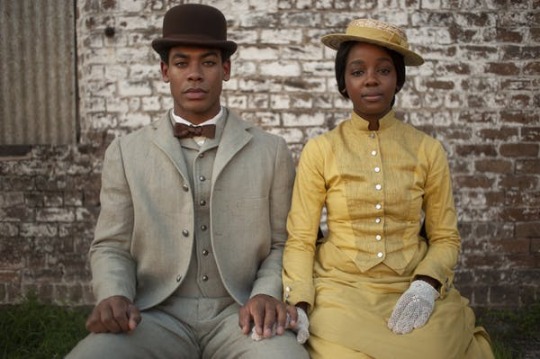
Above: Caesar, played by Aaron Pierre, and Cora, played by Thuso Mbedu, escape from the plantation where they were held as slaves in ‘The Underground Railroad.’ Kyle Kaplan/Amazon Studios
For artists, writers and thinkers it’s difficult to reflect on the dehumanization of masses of people without diminishing some of the characteristics that make them unique. And once you step onto that path, it’s a short journey to reducing the identity of the collective group – including their ancestors – to one that’s defined by their worst experiences.
Seeing slaves on screen
In some ways, because of the nature of their medium, filmmakers have fared better than their fellow artists at balancing the challenges of portraying the horrific experiences of enslaved people as a whole and elevating the particular experiences of enslaved individuals.
So where does Jenkins fit in the lineage of cinematic depictions of enslavement?
From the start, comparisons to “Roots” – the first miniseries about American chattel slavery – abound.
“Roots,” which appeared in 1977, was the first miniseries on American television to explore the experiences of slavery on multiple generations of one Black family. It also created powerful opportunities for interracial empathy. As critic Matt Zoller Seitz notes, for “many white viewers, the miniseries amounted to the first prolonged instance of not merely being asked to identify with cultural experiences that were alien to them, but to actually feel them.”
Some Americans might remember those eight consecutive nights in January 1977 when “Roots” first aired. It was a collective experience that started and shaped national conversations about slavery and American history.
By contrast, “The Underground Railroad” appears in an age replete with representations of enslavement. WGN’s underappreciated series “Underground,” the 2016 remake of “Roots,” 2020’s “The Good Lord Bird,” “Django Unchained,” “12 Years a Slave” and “Harriet” are just a handful of recent innovative portrayals of slavery.
The best of these series push viewers toward new ways of seeing enslavement and those who resisted it. “The Good Lord Bird,” for example, used humor to dismantle ossified perceptions of John Brown, the militant 19th-century abolitionist, and opened up new conversations about when using violence to resist oppression is justifiable.
A delicate dance between beauty and suffering
Looking at “The Underground Railroad,” I can see how and why Jenkins’ vision is so important in this moment.
In Jenkins’ films “Moonlight” and “If Beale Street Could Talk,” the director made a name for himself as an artist who can push past narrow, constraining visions of Black identity as one marked solely by suffering. His films are not free from pain, of course. But pain is not their dominant note. His Black worlds are places where beauty abounds, where the characters in the stories he tells experience vibrancy as well as desolation.
Jenkins brings that sensibility to “The Underground Railroad” as well.
Critics have commented on how Jenkins uses the landscape to achieve this beauty. I was struck by how the sun-soaked fields of an Indiana farm create a perfectly fitting backdrop for the rejuvenating love Cora finds there with Royal.
In “The Underground Railroad,” slavery – for all its horrors – exists in an environment nonetheless imbued with beauty. The curtain of Cora’s vacant cabin flapping in the breeze and framed by the rough timbers of the slave quarters evokes the paintings of Jacob Lawrence.
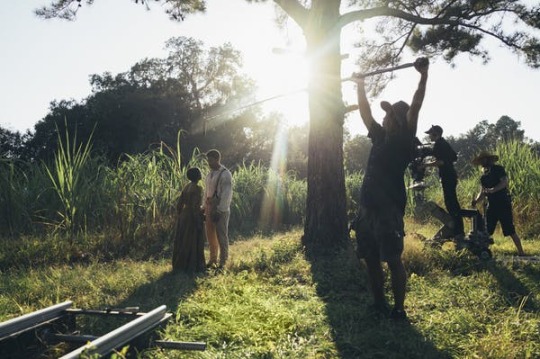
Above: Barry Jenkins’ Black worlds are places where beauty abounds. Atsushi Nishijima/Amazon Studios
In other scenes, Jenkins juxtaposes radically different landscapes and actions to emphasize the complexity of these characters’ experiences. For example, Cora works as an actor at a museum, where she plays an “African savage” for visitors; in one scene, she changes out of the costume and into an elegant yellow dress. Walking the clean, orderly streets of Griffin, South Carolina, she transforms into a picture of middle-class propriety.
Scenes portraying the manners and reading lessons offered by the faculty of the Tuskegee-style institute where Cora and other fugitives find shelter demonstrate the allure of these middle-class values. On first glance, it all appears promising. Only later, when Cora’s pushed by her mentor to undergo forced sterilization, does it become apparent that she’s landed in a horror show.
These vignettes are but a few examples of the thoroughgoing power of Jenkins’ aesthetic. Every episode yields moments of beauty. And yet at the flip of a switch, serenity can devolve into savagery.
Living with the recognition that calm can instantly and unexpectedly become carnage is part of the human condition. Jenkins reminds viewers that for Black Americans – both then and now – this prospective peril can be particularly pronounced.
#film#tv streaming#television#amazon studios#african americans#african american history#slavery#enslavement#underground railroad#featured#thoughts
62 notes
·
View notes
Text
The Long Ballad - thoughts
Just finished The Long Ballad and I have to say, I enjoyed it. Primarily because I went in with 0 expectations. After the brutal and fascinating journey that was Nirvana in Fire, I wanted something that did not require much thought and was enjoyable. And The Long Ballad delivered. I primarily went in for Liu Haikuan, knowing that he is a bit role, and I wasn't disappointed. I will discuss the details of the show below and because there are some spoilers, I will keep it under "keep reading"

PLOT: After the brutal death of her family, Li Changge (Dilraba Dilmurat) goes on a self-imposed exile. The story is about her journey. She goes from an angry, revenge-seeking princess to a woman who comes to see the bigger picture and finds inner peace and true love. This is also the story of Ashile Sun (Wu Lei), the battle-hardened war veteran who slowly comes to realize the futility of war and understand where true happiness lies. This is the journey of Leyan (Zhao Lusi), the soft, sheltered, shy princess who finds her own form of courage and strength. We also witness Hao Du (Liu Yuning), the cold-blooded, by-the-books soldier who falls head-over-heels in love with Leyan. There is also Wei Shu Yu (Alen Fang) who goes from being a useless waste of space to brotherzoning himself. (He does it all on his own. No one places him there.)
The series is adapted from the manhua "Chang Ge Xing" (长歌行) written by Xia Da (夏达). The manhua, apparently, got embroiled in some legal issues with its publishing company and is hence left incomplete. The team of Long Ballad got the writers, Chang Jiang and Pei Yu Fei on board and the duo did a commendable job in making changes in the characters and the story to deliver a complete package to the audiences.
The plot, while complex and layered, is also very sanitized. They touch upon fairly dark topics such as fratricide, human trafficking, slavery, biological warfare, and rape, but the topics are treated with kid-gloves. The rape, for example, is never shown. Only implied. This is a very important detail to remember while watching the show. Do not go in expecting a "Nirvana in Fire" or even "The Rebel Princess", you will be disappointed. Go in expecting a Young Adult story, and you will be rewarded.
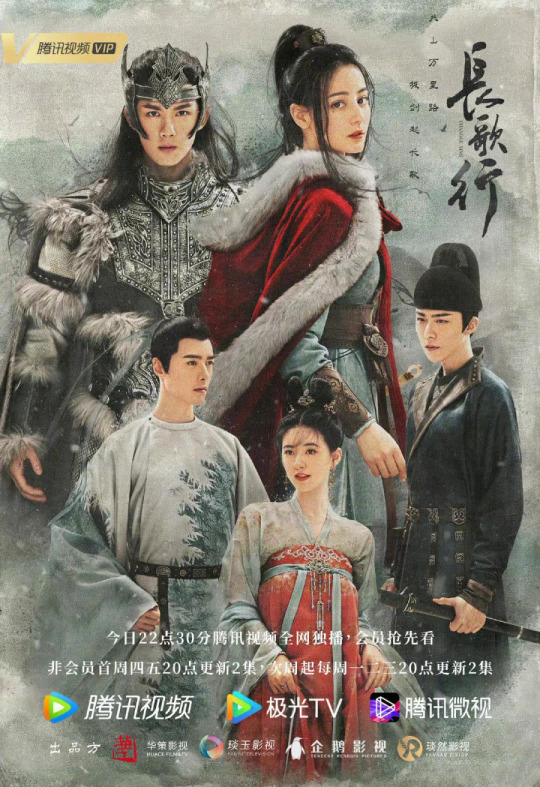
CHARACTERS AND PERFORMANCES:
Li Changge: The protagonist of the story, Li Changge, starts as a boisterous, confident, but naive Princess. This is primarily her story, told mainly through her point of view. She goes from town to town, actively taking part in the governing of the cities/states. Fighting in wars, strategizing, making mistakes and learning from them. Finding both love and inner peace in the process. As you may have gleaned, the character is a bit of a Mary Sue, in the sense that she is almost perennially outsmarting everyone around her and people are constantly complimenting her on her smarts. That said, Changge does end up making a huge mistake and there are some serious consequences to her mistake, which decreases her Mary Sue-ness. The fact that not every man is falling for her like some other Mary Sues we know, coughA'Wucough, is also a HUGE positive. Dilraba Dilmurat does a commendable job as Li Changge and I don't really have anything negative to say about her performance.
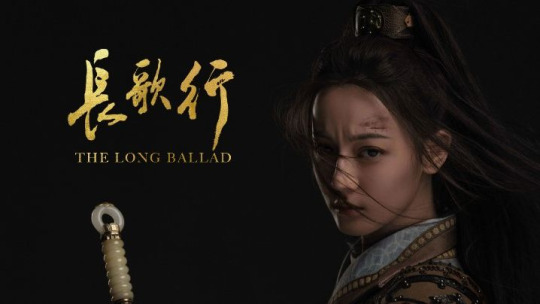
Ashile Sun: He is the Tegin (General) of the Eagle Division of the Ashile Tribe and the foster son of the Great Khan of the Tribe. He is a fierce warrior and a quiet man whose perfectly ordered world is turned upside down upon meeting Li Changge. He is the hero of the story and is a character I enjoyed. Given his age, people did have some concern about Wu Lei portraying such a "masculine" character, but Wu Lei rose to the occasion spectacularly. I could discard Fei Liu (not an easy task, because damnit, I could still see the little murder puppy in some angles because the face is still the same, yet different), and see Ashile Sun instead, so full points to Wu Lei.
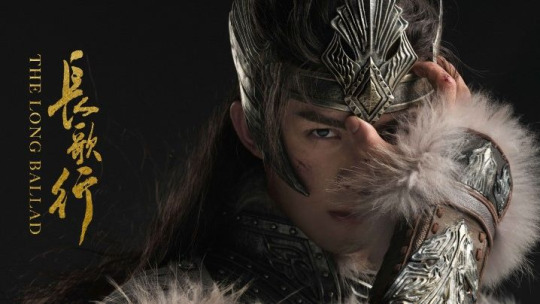
Li Leyan: Leyan starts as the soft and delicate princess who cannot stand up for herself. Her story is so beautifully shown. The way she comes to understand her country, her people, and learn true compassion is so beautifully shown that it really melted my heart. I loved the bits where she came in and Zhao Lusi embodied the character perfectly. Her love story was arguably the best thing in the story.

Hao Du: Meet the guy that stole the show. The stoic, cold-blooded, brutal warrior who is absolutely smitten with Li Leyan, the princess he is supposed to guard. Hao Du is a man of few words and Liu Yuning portrays the complex emotions with his expressions. He conveyed the cold and unfeeling mask, the pure love, the devotion, the heartbreak, and the complete surrender to Li Leyan - he showed it all. It was just... FABULOUS.

Wei Shu Yu: Meet the Ma Zitan of this story. Only, unlike Zitan who is both terrible and useless, Wei Shu Yu is just terribly useless. Alan Fang was reasonably good in portraying this nothing character. There is nothing else to say about him.

Ashile She Er: I have to talk about this character. He starts off as the rival to Ashile Sun, the petty guy who is there to make the hero look good. But slowly, we learn that deep inside, he is just a hurt and confused child who is looking for one person who would love and trust him for who he is. Not for his name, not for his title (Young Khan, ie, crown prince), or the power he wields. His relationship with Ashile Sun is the most complicated one of the story and he gets a beautiful character arc. Kudousi Jiang Ainiwaer portrayed the progression of the character convincingly.
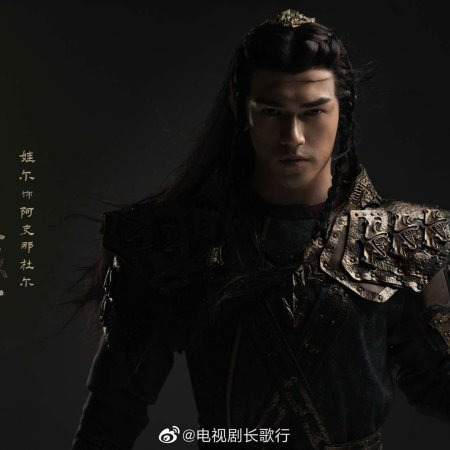
The rest of the cast is adequate.
TECHNICAL DETAILS
OST: The OST is beautiful and is definitely worth a listen. My favorite track is the one sung by Liu Yuning. Man, the guy can sing!
Costumes: The costumes are not the best I have seen (NIF and JOL have spoiled me in that department), but they were not bad either. The fur on Ashile Sun's war costume, especially the one around his neck, made me want to itch my own neck, lol.
Cinematography: The long shots are done well, but the camera does switch angles a bit too often sometimes, which was rather distracting.
Graphics: Since the story is taken from a manhua, there are some scenes, especially the war scenes, that are shown in manhua panels. While this works, mostly, there are scenes where they become a tad comical. There are moments in the series where the graphics are in the background and a character is yelling some dialogue. NONE of those scenes worked. They were cringeworthy. Question to the writers: What do you have against boys aged eight to fourteen? Why did you do this to them?
OVERALL
Overall, I enjoyed the series. Was it the best I have ever seen? No. Definitely not. But this was not the worst either. The series is complete and does not leave any thread hanging or plot point unaddressed. The acting is adequate and I don't have any complains in that department. Yes, it was rather simplistic in its solutions and Changge does get some things done way too easily. The sanitizing of the more serious aspects can be off putting to the viewers expecting a dark, gritty tale. Go in with the expectation of watching a YA story, and you will be treated to an enjoyable one.
Final rating: 7 out of 10.
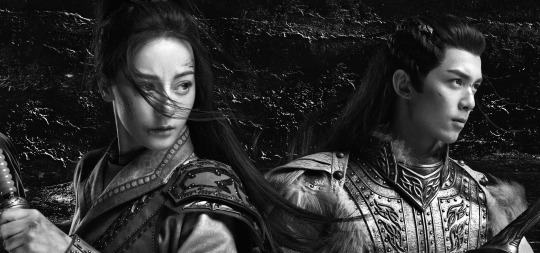
#The Long Ballad#review#Li Chengge#dilraba dilmurat#ashile sun#Wu lei#li leyan#zhao lusi#hao du#liu yuning#wei shuyu#Alan fang#Ashile she er#kudousi jiang ainiwaer
53 notes
·
View notes
Text
The Mysterious Benedict Society as an adaption
So far, The Mysterious Benedict Society adaption feels very faithful to the books. There are definitely changes (Constance, for instance, has been aged up, and likely has a different background. This is understandable. It would be nigh impossible to portray her as she is in the books in live action format--for example, none of the kids in the book suspect she’s a toddler, let alone two years old). However, most changes have all felt reasonable and add to plot and pacing.
I especially enjoy the additions: showing the adult side of the team, for example, or Ms. Perumal’s growing concern about Reynie’s whereabouts, or the girls’ nighttime conversations. Some changes are more extreme. The Mr. Curtain of the books is clearly a villain. He’s condescending and rude, and the only people who like him are bullies. Mr. Curtain of the show is much smoother. It’s easy to see how he’s managed to influence people. Similarly, the L.I.V.E. curriculum is much less obnoxious in the show (not just memorizing nonsense by rote), and as a result, the school’s students seem less stupid and cruel. You can see why they enjoy attendance.
I’m particularly pleased that Number Two’s weirdness has been amplified. Mr. Benedict’s found family is delightfully strange, and I love watching their unusual rhythms. It will be easy to believe when (or if) it’s revealed that the women have been legally adopted into Mr. Benedict’s family.
Similarly, I love how they intensified the quirky feel of the setting and characters. Of course Number Two built a house in the woods in a day because she has a woodworking hobby. Of course there’s secret tunnels and drawers and compartments in Mr. Benedict’s house. Of course Milligan’s disguises and mannerisms are wackily memorable instead of just matter-of-fact. The books themselves have a stylized feel at times (they kind of remind me of Lemony Snickett’s A Series of Unfortunate Events, though with none of the grimness).
I love the overall aesthetic. When I first read the books, they didn’t strike me as being set in the past, but the vaguely vintage feeling works excellently. (I was also a fully grown adult before I realized that the Incredibles wasn’t set in the present, so...) The color schemes, costumes, and sets have distinctive feelings and coordinate well. The effect is stylized rather than naturalistic, which is appropriate and amplifies the tone of the scenes. The bright colors and rough textures of the wooded hideout and its inhabitants’ costumes contrast nicely with the clean lines of tL.I.V.E.’s vintage-pastel interior and sleek exterior.
I also enjoyed the way they did Kate’s flashback as rough home footage. Similarly, I enjoyed the way they showed four kids solving problems on the same screen, how they illustrated Reynie’s thought process with overlaid sketches of the problems, and the way words show up on the screen during the tests for emphasis. The combination of animations, showing multiple things at once, and creative angles for emphasis did a great job conveying the feeling of the tests. (Unfortunately, I lack the vocabulary to describe the techniques they used here).
There’s two things I didn’t enjoy. The first was killing Sticky’s parents to make him an orphan. It mattered in the books that he felt rejected by his own parents. Making it his aunt and uncle who (seemingly) care more about money and fame than the child they’re raising feels a little too much like the wicked stepmother trope. I don’t know why the showmakers decided that Of Course They’re All Orphans, because while most of the book characters are orphans, Sticky isn’t, which serves to show that you can feel rejected and hurt by your parents even when you’ve got an ordinary, non-abusive nuclear family. It’s about feeling isolated, whether or not you’re technically alone.
Secondly, all the wheelchairs have been removed from the adaption. I’m not sure why this was done. Sticky’s mother has bad arthritis and requires a wheelchair. In the books, this was done without fanfare; it was as normal as anything else to oil Ms. Washington’s wheelchair in damp weather, or load and unload it from cars in later books. She was more of a background character, so it didn’t affect the plot, but the casual background representation was a welcome contrast to many books that assume being disabled is strange and uncommon, and that disabilities only exist when they’re plot-significant. The aunt who replaced Ms. Washington used no mobility aids, which disappoints me, especially as the woman she replaces in the books is ultimately shown to be a flawed but loving parent who’s dedicated to making up for her mistakes.
The other person missing their wheelchair is Mr. Curtain, the villain. I’m also not sure why this was removed? It could be to avoid the Evil Disabled Villain trope, but in the book, I didn’t feel like his disabilities were treated as a moral flaw or an excuse for his villainy. He shares his narcolepsy with the unquestionably benevolent Mr. Benedict, so it didn’t feel like his condition was used to vilify him.
He and Mr. Benedict act cope with their condition differently: Mr. Benedict relies on trusted family members for support and chooses to sit on the floor and avoid positioning himself in tall places from which he could fall, whereas Mr. Curtain disguises his narcolepsy by wearing mirrored glasses and using a wheelchair that secures an upright posture, so that no one knows when he has an episode. He does use his wheelchair aggressively, banging through doors and zooming around and forcing people to jog and keep up, but it felt like his use of mobility aids grew naturally from his character.
The books also include a scene where he shocks the children by leaving his wheelchair to chase them. They assumed that using a wheelchair=completely unable to walk, a common view in US society. Importantly, I didn’t feel like the scene was framed as particularly deceptive, like he was lying to them by using a wheelchair when he could walk. Rather, it fit into a pattern of Mr. Curtain managing assumptions and expectations: he doesn’t want people to take advantage of his weaknesses, yet wants to hold a few cards close to his chest. He doesn’t have to lie to people, just let them see and hear and assume what they will.
I don’t use a wheelchair or have narcolepsy, so I’m not in a position to say whether or not the books have good representation. Maybe the fact that Mr. Curtain is evil, and also zooms around and bangs through doors, is uncomfortable. Maybe the fact that his nefarious devices are wheelchair-accessible and in fact designed around his chair sends the wrong message. Maybe using mobility aids to conceal a disability sends a bad message, or maybe it would be better if the good guy was the one to use a wheelchair to cope with his disability. I don’t know. I do know that Mr. Benedict’s condition is played for laughs in both the book and show, and that might be uncomfortable. I do think it’s worth noting that Mr. Benedict’s narcolepsy is seen less and less as funny as the books go on, and grows to be seen as an endearing quality that emphasizes how much he loves people, since his attacks usually underscore with strong emotions and convey worry for his loved ones or joy at their company.
My own sense is that both approaches to narcolepsy make sense, and neither is shown to be inherently faulty. Rather, it’s Mr. Curtain’s character that’s to blame for his villainy--his arrogance, condescension, and mistrust. Both characters feel well-developed and consistent, and their disability is only one part of them. Their disability is colorful, but it’s colorful in the same way as the main characters (Sticky’s anxiety and memory, Kate’s gusto, eye for measurement, and bucket, Constance’s precociousness, etc).
As for why Mr. Curtain’s wheelchair was cut, I’m not sure. Maybe the show writers just didn’t want to deal with the ramifications of depicting a villain in a wheelchair, and decided to cut it altogether (a lazy reason, I think). Alternatively, it seems like they’re depicting narcolepsy without cataplexy, eliminating the need for a wheelchair (a better reason).
On the other hand, Mr. Curtain’s attitude and mannerisms bear the least resemblance to his book counterpart of all the show’s characters. They’re incorporating some backstory from the other books to build a secondary plotline, and I’m not sure how it’s going to play out. From what we’ve seen of him so far, S. Q. Pedalian is also drastically different (shy, cloistered, and openly acknowledged as Mr. Curtain’s son, instead of the gregarious, bumbling, misfit Executive of the books). The TV dynamic between him and Mr. Curtain is largely unrevealed as of yet. Since these changes constitute departures from the book, I’m not sure how the future story’s going to play out around them, and what that reveals about why the wheelchair was cut when it was so characteristic of Mr. Curtain’s mannerisms while other things (like Mr. Benedict’s use of plaid) were included.
Still, it does disappoint me that two wheelchairs were erased, and no one in the show uses one, not even background students.
Overall, though, apart from the orphan and wheelchair situation, I’m very pleased with this adaption and think that the pacing works wonderfully. It’s a near-ideal format for a video adaption (I think animation would be best, but this is a close second).
#the mysterious benedict society#the mysterious benedict society adaption#tv adaption#the mysterious benedict society show#ledroptha curtain
44 notes
·
View notes
Note
Last anon made me curious now... who do you think is stronger emotionally? (Between Kaito and Shinichi) I think it's Shinichi because the stuff he has gone through is a lot worse than Kaitos, even though Kaito isn't having a walk in the park either.
FFFFFFFFFFFFFFFFFFFFF dude, okay. Now, here I’m gonna have to agree with you on this one.
Don’t get me wrong. Kaito is incredibly strong. He had to deal with his father’s death when he was little, now his mom is... almost constantly out of the picture. He has it difficult. And here’s the thing- he actually strikes me as more of a lonely person than Shinichi does. I know, most people would scream at me because WHAT? HAPPY CHEERY KAITO??? SOCIAL BUTTERFLY KAITO WHO IS ALWAYS CRACKING JOKES AND PRANKING PEOPLE “LONELY”? YOU CRAZY??? Well I just- don’t think Kaito is as happy and cheery as he pretends to be. And I definitely don’t think he’s as social as he’s portrayed to be most of the time in fanon.
Canon Kaito has Jii as his only connoisseur, the ONLY person who knows he’s Kid and who he can talk to freely (Hakuba doesn’t count because Kaito hasn’t admitted it and they don’t share things, at least not from Kaito’s side, willingly). He has Aoko, that’s true. He has Nakamori, who actually likes him. But I’m sorry, I don’t think Kaito considers neither Akako nor Hakuba his friends, at least not for now. (NOT TO SAY THAT I DON’T ENJOY WHAT FANON HAS DONE TO EXPLORE THEIR DYNAMICS PEOPLE, I LOVE THE EKODA GANG, THEY COOL).
He’s suffering because he’s pursuing something that he’s not even sure exists, and he’s all alone doing something that he mostly doesn’t want to do, he’s commiting crimes, he could go to prison, his life could go to shit if he screws it, and it’s all because of his father, who has... btw, taught him some ways that are incredibly harmful emotionally (the whole poker face thing seems really hurtful to me, and I think we can all agree on that). And don’t even get me started on the whole Toichi might be alive thing because I WILL lose it. Kaito definitely doesn’t deserve that, and for a manga that’s supposed to be more lighthearted it would be an incredibly dark twist, I don’t even know how Kaito would possibly react to something like that being true and it honestly scares me. Kaito does not deserve that at all, and I think I’d rather have Toichi stay dead.
Kaito has to be able to move on eventually, leave the whole Kid thing behind so he can start to be truly open and honest with Aoko, because up until then... I’m not sure if he would be emotionally mature enough or prepared enough to be able to be in a serious relationship with her. Which is one of the main reasons why I will always stay on the “Kaito has to find Pandora soon and then quit being Kid” part of the fandom. I’m not sure if it’s a popular opinion or not, but I’ve definitely seen some saying that Kaito should keep doing heists after the Pandora thing is resolved, and I can’t say that that would sit right with me?
But here’s the thing. At least Kaito has some stability in his life atm. He has calm between the storms. He has a normal life to go back to after dropping the Kid cape. He has his own body. He chose to be doing what he’s doing. And he’s aware of all dangers and possibilities. He knows the risks and he accepted them by putting on the Kid costume. But Shinichi... Shinichi doesn’t have any of that.
Shinichi’s life was taken from him because of his good intentions. He made ONE mistake, and now all of his life is gone. His stability and everyday life was stolen because he was too eager, too innocent, too curious to see the danger ahead of him. He didn’t deserve to have that happen to him. The experience of that night would be traumatic on its own to most. The pain he had to endure, all of it- He thought he was going to die. He should’ve died. But he didn’t, and now he has to put up an act all day, everyday, 24/7, from the moment he gets up to the moment he goes back to sleep.
And yes, Shinichi strikes me as more social, which goes along with the fact that more people know his secret than Kaito’s (and he has more people to share his thoughts with, Heiji on his own is a pretty important anchor for Shinichi’s emotional stability). But you can also see that it also causes him incredible pain. He misses his life so much, he misses Ran (because even if he sees her everyday, it’s not as himself, it’s not Shinichi who she’s talking to or looking at), he misses Sonoko (fight me on this), he misses his friends at school, he misses his house, and he misses his body. Shinichi was stolen of EVERYTHING he had quite literally. And he’s learning an incredibly hard lesson through that. He goes through his days knowing that the slightest slip up will get him and everyone he loves killed. He knows the consequences of his actions now, and it’s scary as fuck.
They are both so strong, I could never, the stress and pression alone would make most people crumble. But they don’t, at least for now. We’ll see how that holds up. But my vote goes to Shinichi here.
116 notes
·
View notes
Text
My Thoughts on Pride and Prejudice 1980: The Ladies Take Center Stage
It's easy to forget that there are dozens, if not hundreds, of other Pride and Prejudice adaptations because the discussion is generally limited to "1995 versus 2005." The subject of this review is the 1980 BBC miniseries adaptation of Pride and Prejudice, which stars Elizabeth Garvie as Elizabeth Bennet and David Rintoul as Mr. Darcy and consists of five 1 hour long episodes. Some Pride and Prejudice fans consider this show as the definitive version of the book, since it was one of the first adaptations that attempted to be faithful to the story by incorporating much more of Austen's dialogue compared to previous adaptations.
1. THE PRODUCTION
The video quality is blurry (typical with 1970s/1980s BBC TV shows), so this adaptation is hard to watch compared with the 1995 and 2005 adaptations. While I like the historic houses used in the miniseries, boring, stuffy studio interiors are used for the interior scenes (except for Pemberley). I would only recommend this adaptation for extreme Pride and Prejudice fans/completionists.
Each episode's opening credits are accompanied by illustrations of what happens in the episodes, reminding the viewer that they are watching a filmed version of the book. The caricatured figures are not appealing to the eye and look dated. It doesn't help that they all are accompanied by "ye olde timey" music.
The costumes are for the most part very historically accurate for the early 19th century Regency Era, possibly even more so than the 1995 version with open chests, since the women's day dresses cover their necks as well. The costume designer mastered the famous Regency era white dress; I liked Elizabeth's white day dress and Jane's white evening gown. However, not all the costumes are flattering; some of the ugly floral patterns and garishly bright colors come straight from the 1970s, while a lot of decent evening dresses are ruined by fake lace or clunky 1970s bibs.
The hair is mostly accurate, with the exception of Mary's straight bangs and pixie cut. Unfortunately, the makeup is of the 1970s, especially with the penciled eyeliner/eyebrows on Jane and Caroline Bingley. Poor Mr. Bingley meanwhile has the most unflattering 1970s "helmet bowl" hairstyle.
2. PLOT AND CHARACTER DEVELOPMENT
The adaptation focuses heavily on the female relationships within the book, much more so than other adaptations. Throughout the episodes, there are many slice-of-life scenes in which the Bennet sisters are gathered together in conversation while occupying themselves with typical activities for women of the Regency era (sewing, flower arranging, trying on clothing).
Charlotte Lucas has a larger role here than in the book. In this adaptation, she frequently visits the Bennet sisters at Longbourn, and the screenwriter uses her dialogue as a representation of the Regency perception of marriage as an economic proposition.
Mary Bennet also receives more screen time, and like Charlotte, she voices Regency attitudes towards women in general through her didactic remonstrances.
The many scenes in Elizabeth and Jane's bedroom are a means for Elizabeth to express the feelings and attitudes that she keeps hidden from society.
Elizabeth's favoring of Mr. Wickham is more obvious; she even pronounces him to be "above everyone, in person, countenance, [and] air" and is delighted that Wickham's trash-talking of Darcy confirms her hatred of him.
Inner monologues highlight Elizabeth's mental transformation as she grapples with the consequences of her prejudice against Mr. Darcy and considers the consequences of her family's social gaffes.
I dislike that the show chose to end with Mrs. Bennet's joy over the advantageous marriages of her elder daughters. It reinforces the perception that these marriages are ultimately for money rather than love.
The cast consists of largely unknown (to a mainstream audience) British actors whose portrayals of the characters are solid and replicate the book exactly. The rest of the supporting cast portray the characters just as they are in the book, but do not otherwise stand out. Here are my comments on the lead actors and other supporting cast:
Elizabeth Garvie: Garvie effectively portrays Elizabeth's wit, intelligence, and poise. She also looks right for the part, as she is believably youthful and has captivating eyes. Her pride is not so obvious because Garvie acts like a proper Regency girl, but it is brought out by the way Elizabeth looks people straight in the eye and addresses them directly while confidently stating her opinions, however flawed. My only minor nitpick is that Elizabeth is less vulnerable here; most of the time she is confidently in control of every situation she faces and has a smile for everyone.
David Rintoul: Rintoul looks the part, as he is tall, handsome, proud, and carries himself gracefully. However, he is too stiff and boring like a robot. In many scenes, even private ones with his close friends, he is always standing at attention like a soldier. With the exception of the Pemberley visit and the second proposal, he never smiles, and his voice is very monotone, even in the key romantic scenes where he is supposed to lose himself to his great passion for Elizabeth. Though he tries to appear amused at times, and shows some intelligence, his stiff body language never changes, undercutting the meaning behind his words.
While fans of this show have praised Rintoul for being stiff, like book Darcy, this stiff portrayal hinders Darcy's character development, since he must change his cold manners in order to be worthy of Elizabeth's love. There are MANY instances in the book where Darcy shows some emotion; he smiles as he teases Elizabeth at Rosings, becomes angry when Elizabeth rejects his first proposal, and blushes when he sees Elizabeth at Pemberley. This Mr. Darcy is "all politeness" and we don't get to see Elizabeth peeling back his cold exterior to reveal the good man underneath, unlike in the book.
Malcolm Rennie as Mr. Collins: His portrayal of Mr. Collins is very similar to 1995's Mr. Collins, as both are fat and simpering (maybe 1995's portrayal of Mr. Collins is a copy of this one, except even grosser). I also like how he is super moralizing and preachy in this version. He even walks like a penguin too!
Casting I disliked:
Moray Watson as Mr. Bennet: His Mr. Bennet is thoroughly unsympathetic; he does nothing but scold the family, slam doors, and drink tea. While Mr. Bennet is a neglectful parent, he expresses his dislike of the family in far more subtle ways and does not get into fits of anger easily.
Judy Parfitt as Lady Catherine de Bourgh: While the adaptation makes clear that Lady Catherine likes getting her way, this Lady Catherine isn’t intimidating enough to frighten anyone into submission. What doesn't help is that the scene where she interrogates Elizabeth about her family situation is cut; this scene is important in establishing Lady Catherine's tyrannical personality.
The actresses hired to play Kitty and Lydia Bennet are far too old for the parts; they do not look like teenagers!
Scenes I liked:
The opening scene -- the adaptation gives Charlotte a larger role, as she visits Elizabeth at Longbourn right after the news of Bingley's arrival. She also reveals her practical view on marriage as a necessity for securing comfort, which is at odds with Elizabeth's view of marriage as an equal partnership between people who love each other.
"First Impressions" -- Elizabeth shares her bad opinion of Darcy with Jane and reveals that the Bingleys earned their wealth in trade, making them "new money" as opposed to the Darcy family, which has many generations of nobility. This detail about the origins of Bingley's wealth could explain Caroline's extreme arrogance and make Jane's separation from Bingley on the basis of her poor connections more cruel.
Elizabeth at Mr. Lucas' party: This adaptation includes a scene from the book which isn't in many other adaptations, not even the 1995 miniseries. Elizabeth, acting impertinently to catch the attention of Darcy's "very satirical eye," addresses him sarcastically. Charlotte then gets Elizabeth to play the piano and she takes another opportunity to show off her wit:
"There is a fine old saying, which every body here is of course familiar with - 'Keep your breath to cool your porridge', and I shall keep mine to swell my song."
Jane and Elizabeth at Netherfield. In a series of scenes, Elizabeth confides in Jane her true thoughts and feelings about Darcy, the Bingleys, and the Hursts. For instance, she theorizes about why Darcy stares at her and rants about how disagreeable and annoying the Netherfield party are. It's really entertaining to see Elizabeth driven to frustration by the arrogant rich people.
Any scene with Mr. Collins in it, but here are the funniest ones:
Mr. Collins eating with the Bennet family: I laughed at how he examines the food with a critical eye before shoving it in his mouth quickly. It perfectly captures Mr. Collins' arrogance combined with bad manners.
Mr. Collins at the Netherfield Ball: he cannot dance and embarrasses Elizabeth (definitely a parallel with the 1995 version, where he bumps into the other dancers and apologizes profusely).
Mr. Collins' first proposal to Elizabeth: I laughed at the added flourish (not in the novel), where he bends down on one knee, but instead of professing love for the intended, states proudly to Elizabeth that the main benefit of the marriage is the patronage of Lady Catherine de Bourgh.
Collins' proposal to Charlotte Lucas: this is not in the original book, as it is (mostly) limited to Elizabeth's point of view, where she only finds out about the proposal after it happens. This comical scene begins with pleasant music and blooming flowers to establish romantic connotations, before it cuts to an awkward Mr. Collins following Charlotte Lucas. When Charlotte accepts Mr. Collins, they are sitting together by a rosebush, and his pure joy at the unromantic, arranged marriage, combined with the floral imagery from earlier, elevate the situational irony and make for a good laugh. The flower imagery also ties into Charlotte's earlier comparison of marriage to growing a plant; Elizabeth challenges Charlotte's assertion by asking her what would happen if the soil was poor (metaphor for the respect Elizabeth feels is a foundation for a loving relationship).
Aunt Gardiner's advice to Elizabeth: This scene isn't included in other adaptations, not even the 1995 miniseries. Here Aunt Gardiner warns Elizabeth against falling in love with Wickham, telling her that she needs to keep her common sense intact; Elizabeth dismisses this, fully confident in her powers of judgment. It's great that this exchange is included because it foreshadows the discovery of Wickham's true character, and hints that Elizabeth's perceptions of others may be wrong.
Scenes I disliked:
The romantic scenes. This adaptation unfortunately fails in the romance department; there is zero chemistry between the actors; even the otherwise wonderful Elizabeth Garvie is not exempt. (more about this later).
The first country ball. The interior is dark, small, cramped and stagey. Also, the dancing and overall manner of the guests is very sedate and orderly; it’s so quiet you can hear the dancers feet scrape the floor in spite of the music. This isn't very realistic compared with the other adaptations, where we are presented with much more boisterous country dances.
The activation of Stalker Darcy: While Elizabeth plays the pianoforte, Darcy, while shrouded in darkness, moves like a ghost among the crowd until he all of a sudden appears very close to the pianoforte and golf-clapping. perhaps Darcy is a blood sucking vampire? Though this scene is entertaining for all the wrong reasons, it doesn't make sense that Darcy's love for Elizabeth makes him even more robotic and creepy.
Lady Catherine confronting Elizabeth: While the dialogue for this scene is lifted straight from the book, there isn't quite enough fury and anger on the part of either person.
3. THE SCRIPT
What makes this adaptation stand out is the script by Fay Weldon. While the majority of the script is taken directly from the book, many have commented that her interpretation of Pride and Prejudice is much more feminist because of the greater emphasis on Elizabeth's point of view, as well as her relationships with other women. Many of the creative changes made emphasize the ridiculousness of the patriarchy and Elizabeth's outspokenness. In addition, Austen's narration slips into the dialogue of the female characters; for instance, Mary proclaims the village's judgment of Darcy as "the proudest most disagreeable man in the world."
Creative Changes/Great Quotes from the Script:
Darcy adding further insult to injury: after proclaiming Elizabeth to be unattractive to him, he adds: "She has too many sisters."
Mrs. Bennet criticizing poor Mary: “You read too much! No wonder you’re shortsighted.”
Elizabeth has had enough with Darcy, the Hursts, and the Bingleys: “Jane, they are monsters! They like nothing and dislike everything!"
Elizabeth has no patience: "This is unendurable! Mr. Darcy has scarcely spoken more than 10 words to me during the whole of today!"
Mary Bennet praises Mr. Collins' writing skills: "But he is intelligent. In point of composition the letter he wrote Father was not deficient and it was very long."
Mr. Collins scrutinizes Longbourn (his future inheritance) Part 1: "The hall. The hall should be imposing. This one is spacious enough but a little dark..."
Mr. Collins scrutinizes Longbourn Part 2: "Truly a gracious dining room. Lady Catherine de Bourgh would not be ashamed to dine here...The table, though a trifle rustic, is solid and a good match."
Mr. Collins provides much needed moral lessons to Kitty and Lydia: "I have often observed how many young ladies are very little interested in books of a serious stamp, though written solely for their benefit. Certainly there can be nothing so advantageous to them as instruction."
Mr. Collins on Anne de Bourgh: "She is agreeably fragile, and she is to marry Mr. Darcy."
Lady Catherine de Bourgh supporting the patriarchy: "If I were to have more children, they should all be sons."
Mr. Collins' Aquatic Hat: In one of many examples where Lady Catherine micromanages everyone's life, she orders Mr. Collins to plant bulrushes by the lake and per her instructions he orders an ugly top hat with a shower cap inside it to prevent himself from drowning. Charlotte and Elizabeth laugh about it when Mr. Collins isn't looking.
Darcy is a dog person, how sweet! Before the first proposal and before he meets Elizabeth again at Pemberley, Darcy is accompanied by a dog. Perhaps if he brought his dog to the first proposal it would have succeeded?
Elizabeth's internal monologue after she reads the letter: I normally dislike internal monologues because they detract from the action or become redundant, but I like how this adaptation utilizes the internal monologue to show Elizabeth actively confronting her prejudice against Mr. Darcy and acknowledging that she has acted wrongly in judging him harshly. Some adaptations reduce or even leave out this fundamental part of Elizabeth's personal growth. My only quibble with this scene is that Elizabeth lets go of her prejudice too soon and in too calm a manner. In the book, she is initially angry at Darcy and needs to reread the letter multiple times before she starts to form a grudging respect for Mr. Darcy. For Elizabeth, letting go of her prejudice is a slow, exhausting, and emotionally taxing process, unlike in this adaptation, where her logical reasoning allows her to quickly overcome her unreasonable hatred of Darcy.
4. THE ROMANCE (or, to be more accurate, lack of)
Many of the key romantic scenes between Elizabeth and Darcy are shortened, which surprised me because the length of a miniseries in general allows for more character development. I was hoping to see a fuller picture of Darcy and Elizabeth's relationship than could be provided in a movie.
While the female characters of the adaptation are fully rounded and have many opportunities to express their perspectives, the male characters remain one-dimensional and do not get the same treatment as the women. In other words, the male characters are reduced to mere objects of affection.
Some critics have argued that Darcy is irresistible to women in part because he is mysterious. Even his appearance is left to the reader's imagination, as Austen only notes that Darcy has a "fine, tall person, handsome features, noble mien...[and] ten thousand a year." Thus, the reader gets to craft their ideal version of Mr. Darcy; he could look like any handsome man. When the "historically accurate Mr. Darcy" image was released several years ago (where he looks like George Washington); many, including me, were disappointed because we all have different images of Mr. Darcy in our heads (or more likely, we pick between Colin Firth and Matthew Macfadyen). This adaptation capitalizes into the mystique of the character by leaving the viewers to guess Darcy's intentions. Since we do not have access to his internal thoughts or motivations, we are limited to what we see before our eyes, much like the Meryton villagers. We do not get to see how Darcy develops feelings for Elizabeth; nor do we see how he is like in private occasions (even when alone with his friends, he says little and reveals little).
Other critics/Austen scholars/fans have argued that the one-dimensional treatment of male characters is in keeping with the unique writing style of Pride and Prejudice. Typically, female characters were the ones reduced to objects of affection for the male characters. Austen reverses this norm by focusing more on Elizabeth's viewpoint while Darcy remains mysterious.
Though a more reserved Darcy may work in the book, it does not serve the development of the romance well. Darcy's falling in love with Elizabeth is characterized by a gradual loss of control over himself; in his words he was "in the middle before I knew that I had begun [falling in love]." After all, he cannot stop staring at Elizabeth and frequently tries to keep talking to her at Netherfield before he begins to feel "the danger of paying Elizabeth too much attention." During his first proposal, he is agitated, and when Elizabeth rejects him, becomes angry. It is obvious, in the book and in the 1995 and 2005 adaptations as well, that the man is clearly an emotional train wreck.
The conflict between Darcy's outer shell and inner self is a key part of his falling in love with Elizabeth, and the adaptation misses out on this with a stiff, wooden Darcy who always carries himself properly and never smiles. In general, the most entertaining romances have this tension between self-control and passion, with lapses in manners usually the only sign of the passion beneath the surface; after all, in Elizabeth's words, “Is not general incivility the very essence of love?”
Back to the idea of the one-dimensional Darcy being an inversion of gender norms in writing: I have to disagree with this because (this is obvious I'm sure) Darcy is still a fully rounded character and does undergo his own journey, since he has to change his manners to earn Elizabeth's love. This quote shows what Darcy has learned about himself:
"I have been a selfish being all my life, in practice, though not in principle. As a child I was...given good principles, but left to follow them in pride and conceit. Unfortunately an only son, (for many years an only child) I was spoilt by my parents [who] almost taught me to be selfish and overbearing, to care for none beyond my own family circle, to think meanly of all the rest of the world, to wish at least to think meanly of their sense and worth compared with my own."
Though some fans of this adaptation like how the other relationships are treated with equal importance as the well-known love story, the romance is important as a source of personal growth for Elizabeth as well as Darcy. After all, they do have to overcome the "pride and prejudice" that separates them.
The marriage of Darcy and Elizabeth is a feminist triumph for Elizabeth Bennet; in my review of the 2005 movie, I noted that Elizabeth Bennet is revolutionary because of her unwillingness to compromise on her belief that marriage should based on love and respect, contrary to the prevailing social view of marriage as an economic proposition. While it seems counter-intuitive for a repressive institution like marriage to be a feminist triumph, Austen's heroines use marriage as a means of gaining not just material comforts, but ultimately the self-respect they desire by uniting themselves with partners whom they are equals with. The marriages Austen's heroines make are testaments to their independence, as they are choices made by the women themselves. Even Charlotte Lucas' otherwise unhappy arranged marriage works for her, since she enjoys the freedom that running her own household gives her. Not focusing on the romance of Elizabeth and Darcy leaves out Austen's complex perspective on marriage as a social necessity but also an unlikely route to freedom.
Here's my breakdown of the Elizabeth and Darcy scenes in this adaptation and why the romance fails:
"She is tolerable:" Elizabeth reacts rather too sedately to the insult Darcy gives her (and he also makes an added comment about her having too many sisters); unlike in other versions where she attempts to suppress a laugh or even taunts Darcy outright. The adaptation diverges from the book by having Elizabeth tell her mother instead of her friends about Darcy's insult; it does not make sense why Elizabeth would confide this in her mother, given that she knows her mother is a fool.
Netherfield dance: Darcy attempts to flirt with Elizabeth during this dance (which only lasts one minute!), but doesn't succeed because of his poor social skills and her prejudice. It's also an amazing battle of wits, as Darcy counters Elizabeth's accusations while admonishing her not to trust Wickham.
Unfortunately, the adaptation cuts out essential dialogue revealing the extent of Elizabeth's prejudice and foreshadowing the discovery of Wickham's true character. For example, what isn't included is Elizabeth's accusations that Darcy is to blame for ruining Wickham's life, to which he replies that Wickham is capable of charming others but not necessarily of retaining good friends.
More significantly, the adaptation cuts Elizabeth's admission that she cannot figure Darcy out:
"'May I ask to what these questions tend?' 'Merely to the illustration of your character,' said she...
'And what is your success?' She shook her head. 'I do not get on at all. I her such different accounts of you as puzzle me exceedingly.'
'...I could wish, Miss Bennet, that you were not to sketch my character at the present moment, as there is reason to fear that the performance would reflect no credit on either.'"
The development of the romance is harmed due to the omission of the portrait metaphor. Here, Darcy shrewdly observes to Elizabeth that her judgment of character may be flawed and foreshadows the discovery of her prejudice against him. After his many observations of Elizabeth, Darcy knows her so well that he can read her like an open book (though he underestimates the extent of Elizabeth's prejudice against him). The metaphor of the picture as a representation of character also becomes literal through Darcy's portrait at Pemberley; Elizabeth only falls in love with Darcy after examining his character through the portrait.
Ultimately, the Netherfield Ball dance between Elizabeth and Darcy is essential in demonstrating the fallacy of first impressions, and reducing the dialogue only to the beginning part where Elizabeth teases Darcy on his inability to make small talk undermines the richness of the story.
Darcy's first proposal: This scene is definitely the worst one in this miniseries because it fails on so many levels. First, this Darcy remains stiff throughout the entire proposal, like he was at a public ball rather than declaring love. This is a total contrast to book Darcy; who, though formal, is "agitated" and "pale with anger" at times. Those famous opening lines ("In vain I have struggled...") are delivered so quickly and without any sort of overwhelming passion. What should be the climax of Darcy finally letting the volcano of his repressed emotions erupt (with bad consequences for him) instead becomes a cold recitation of the script. Elizabeth also becomes robotic as well, repeating her lines back with a detached tone of voice as if reading a teleprompter. I'm warning you: be prepared for the worst 5 minutes of your life.
Visiting Pemberley: The adaptation utilizes Elizabeth's inner monologue as she praises Pemberley; it's interesting to people who have read and re-read the book, but I don't think it's necessary to "copy and paste" large portions of the book and read them to the audience.
I do like that this adaptation clearly indicates that Elizabeth still stands by her decision to reject Darcy's first proposal, even though she really likes his great big house:
"'And of this place,' thought she, 'I might have been mistress! 'I might have rejoiced in [these rooms] as my own, and welcomed to them as visitors my uncle and aunt. - 'But no'... 'I should not have been allowed to invite them.'"
Most adaptations include the "Pemberley could have been mine" part, but don't include Elizabeth's realization that Darcy's class prejudice would have estranged her from the Gardiners (unfortunately that includes the 1995 miniseries). Including Elizabeth's thoughts about her aunt and uncle dispels the perception that she is a gold-digger who marries Darcy only after realizing how rich he is.
The portrait: why, why, why does Darcy not smile in his portrait?! The book LITERALLY EMPHASIZES that DARCY SMILES in his portrait, revealing a more sensitive side to him than his cold and formal appearance would otherwise suggest. Big mistake.
Lydia's elopement: the adaptation messes up this scene so badly, which is unfortunate because the scene is important in showing how much Elizabeth trusts Darcy and how much he still loves her, as shown through his concern for her. First, it diverges from the book by having Elizabeth run several miles to Pemberley (while fully outfitted in a spencer, bonnet, and long dress) and somehow she doesn't sweat or faint from the exertion. Running to Darcy to tell him the news doesn't make any sense, since the book makes clear that she did not want anyone outside her family to know about Lydia's elopement, or else her marriage prospects would certainly be ruined; the news devastated her because she feared losing Darcy's respect due to his social prejudice. Darcy learning of the news was purely a coincidence because he happened to be waiting for her at the inn where she was staying (aw how romantic!). As for Darcy, he remains cold and doesn't seem concerned enough for Elizabeth, in contrast with the book, where he immediately springs into action. The adaptation also omits Darcy's kindness by cutting out the part of the scene where he consoles Elizabeth, gets her to sit down, and brings her some wine.
Second proposal: Darcy breaks the rules of social etiquette by going out alone with Elizabeth before proposing to her, unlike in the book where they are with Jane and Bingley, but this scene is still thoroughly unromantic because the two actors have zero chemistry.
5. CONCLUSION
Although this adaptation has some good moments, the dated production design, underdeveloped romance, and wooden acting means that I will only recommend this version to Pride and Prejudice nerds/extreme book purists. The adaptation is boring to watch unless you know the book by heart.
This script highlights Austen's wit and sarcasm, but the performances don’t always do it justice. The feminist approach to the novel makes the adaptation stand out, but comes at the cost of Darcy's character development and the central love story.
Purists and casual book fans are better served by the 1995 BBC miniseries, which has the right balance of entertainment, historical accuracy, and faithfulness to the novel.
Thanks to JASNA (Jane Austen Society of North America) for all the wonderful online articles that I pull many of my ideas from. I spent many hours entertaining myself by reading their scholarly analyses of Jane's other works as well as those related to Pride and Prejudice, and they have really helped me as I write these reviews.
@princesssarisa @austengivesmeserotonin @dahlia-coccinea @obscurelittlebird @appleinducedsleep @colonelfitzwilliams

#book adaptation#pride and predjudice#pride and prejudice#elizabeth bennet#mr darcy#mr bingley#long post#tv show review
27 notes
·
View notes
Text
FICTIONAL CHARACTER ASK: FIGARO
TAGGED BY: @princesssarisa
@professorlehnsherr-almashy @superkingofpriderock @tilthenextbluemoon @notyouraveragejulie
FAVORITE THING ABOUT THEM: Lovable Trickster Character Archetype my beloved! Figaro has so many dimentions: he is cunning and ambitious, he is loyal and simple, he is witty and rational, he is sensitive and passionate, he is funny, he has moments of melancholic pathos. All the while never becoming exageratly complicated, he keeps being a character who is easy and accessible for the audience to follow.
LEAST FAVORITE THING ABOUT THEM: His crisis of jealousy against his bride Susanna in the ACT IV of Marriage of Figaro. I can’t avoid asking in my head: “Figaro, if Susanna had any intention of betraying you, do you think she would have told you and Countess Rosina about Count Almaviva’s attempts of seducing her, and build a plot to expose the Count to public shame? No, she would have kept shut up. Why are you distrussing her now”? Yes, i know the librettist Da Ponte needed something to replace the anti-nobility rant of Beaumarchais original play to avoid censorship over the opera, but couldn’t have come up with something instead of the sudden crisis of jealousy and acusing all women of being unfaithfull cliché?
THREE THINGS I HAVE IN COMMON WITH THEM:
*The playfull sense of humour.
*The contempt for the aristocracy.
*Love for Susanna.
THREE THINGS I DON’T HAVE IN COMMON WITH THEM:
*I am female.
*I am not spanish.
*I never worked as a barber.
FAVORITE LINE:
The full lyrics of his introduction aria in Barber of Seville, Largo al Factotum
Largo al factotum della città. Presto a bottega che l'alba è già. Ah, che bel vivere, che bel piacere per un barbiere di qualità! Ah, bravo Figaro! Bravo, bravissimo! Fortunatissimo per verità! Pronto a far tutto, la notte e il giorno sempre d'intorno in giro sta. Miglior cuccagna per un barbiere, vita più nobile, no, non si da. Rasori e pettini, lancette e forbici, al mio comando tutto qui sta. V'è la risorsa, poi, del mestiere colla donnetta... col cavaliere... Tutti mi chiedono, tutti mi vogliono, donne, ragazzi, vecchi, fanciulle: Qua la parrucca... Presto la barba... Qua la sanguigna... Presto il biglietto... Figaro! Figaro! Figaro!, ecc. Ahimè, che furia! Ahimè, che folla! Uno alla volta, per carità! Ehi, Figaro! Son qua. Figaro qua, Figaro là, Figaro su, Figaro giù. Pronto prontissimo son come il fulmine: sono il factotum della città. Ah, bravo Figaro! Bravo, bravissimo; a te fortuna non mancherà. Sono il factotum della città!
(Make way for the city's servant. Off to the shop soon. It is already dawn. Ah, what a beautiful life, what lovely pleasure For a barber of quality! Ah, worthy Figaro! Worthy, superb! Most fortunate for sure! Ready to do anything, night and day, Always around and about. A better Cockaigne for a barber, A nobler life, there is none. Razors and combs, lancets and scissors Are all here at my command. There is also resourcefulness, in the trade, With the young lady, with the young man. Everyone asks for me. Everyone wants me: Women, boys, the elderly, girls. Here this wig; quickly this beard; Here this bleeding, quickly this note; "Figaro! Figaro! Figaro!" etc. Alas, what a fury! Alas, what a crowd! One at a time, for charity's sake! "Hey, Figaro!" Here I am! Figaro here, Figaro there, Figaro up, Figaro down. Swift, swifter, like lightning I am. I am the city's servant. Ah, worthy Figaro! Worthy, superb; Fortune will not fail you. I am the city's servant!)
This line he says to Susanna in the aria Cinque... dieci... venti at the beggining of ACT I of Marriage of Figaro
Sì mio core, or è più bello, sembra fatto inver per te.
(Yes, my dearest, it's very pretty; It looks just made for you.)
And Non più andrai, the famous aria he sings at the end of ACT I of Marriage of Figaro
Non più andrai, farfallone amoroso, notte e giorno d'intorno girando; delle belle turbando il riposo Narcisetto, Adoncino d'amor. Non più avrai questi bei pennacchini, quel cappello leggero e galante, quella chioma, quell'aria brillante, quel vermiglio donnesco color. Tra guerrieri, poffar Bacco! Gran mustacchi, stretto sacco. Schioppo in spalla, sciabla al fianco, collo dritto, muso franco, un gran casco, o un gran turbante, molto onor, poco contante! Ed invece del fandango, una marcia per il fango. Per montagne, per valloni, con le nevi e i sollioni. Al concerto di tromboni, di bombarde, di cannoni, che le palle in tutti i tuoni all'orecchio fan fischiar. Cherubino alla vittoria: alla gloria militar!
(You shall go no more, lustful butterfly, Day and night flitting to and fro; Disturbing ladies in their sleep Little Narcissus, Adonis of love. No longer will you have these beautiful feathers, That light, romantic cap, That hair, that glowing countenance, That rosy, womanly complexion. Among soldiers, by Jove! A big moustache, a little kit. With a rifle on your shoulder, and a sabre on your flank, Standing up straight, hard faced, A big helmet, or a big turban, Plenty of honour, little pay! And instead of dancing the fandango, A march through the mud. Through mountains, through valleys, With snow and with the sun beating down. To the beat of the bugle, Of bombs, of cannons, Whose thunderous report Makes your ears ring. Cherubino, to victory: To glory in battle!)
brOTP: Fiorello, Berta, Marcellina, Cherubino, Barbarina, Rosina the Countess Almaviva, Count Almaviva.
OTP: Susanna.
nOTP: Marcellina, Rosina.
RANDOM HEADCANON: He met and fell in love with Susanna during a Street Carnaval Party: he was dressed in a Arlechino costume, she was dressed as Colombina. Since he was with a fully covering mask, Susanna didn’t saw his face. So the first characteristic of his that enchanted her was his voice, when he went out to serenade her with the spanish folk song “A La Una Yo Nací”.
UNPOPULAR OPINION: Rigoletto may be the most iconic baritone role... for people that already consider themselves opera fans. For casual viewers, if you ask to remember a famous opera sanged in a very heavy voice, they won’t think of “Cortigiani vil razza danata”. They will think in “Largo Al Factotum”, sanged by Figaro in Barber of Seville. So in pop culture, Figaro basically is not only the most iconic baritone role, but probably the most iconic male character of opera in general.
SONG I ASSOCIATE WITH THEM:
Largo al Factotum from Barber of Seville
youtube
Cinque... dieci... veinte and Non più andrai from Marriage of Figaro
youtube
youtube
FAVORITE PICTURE WITH THEM:
This 19th Century Illustration of Beaumarchais Plays, portraying Figaro in an Arlechino Costume
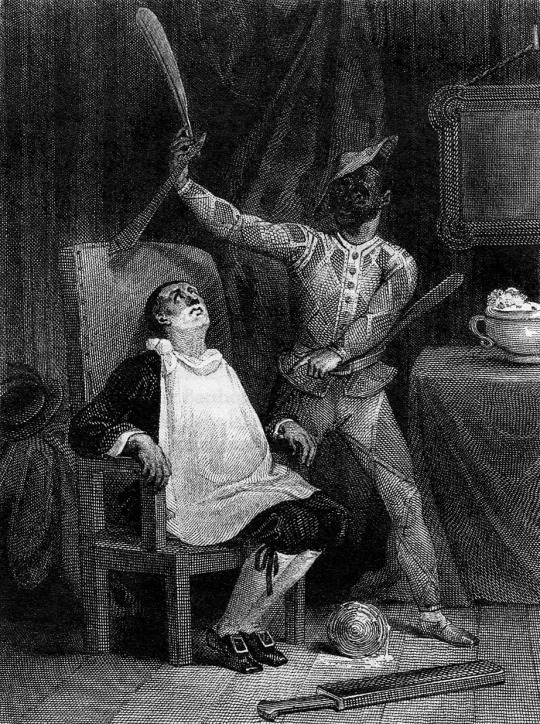
This bronze statue by Jean Barnabé Amy

Picture of Tito Gobbi in the role
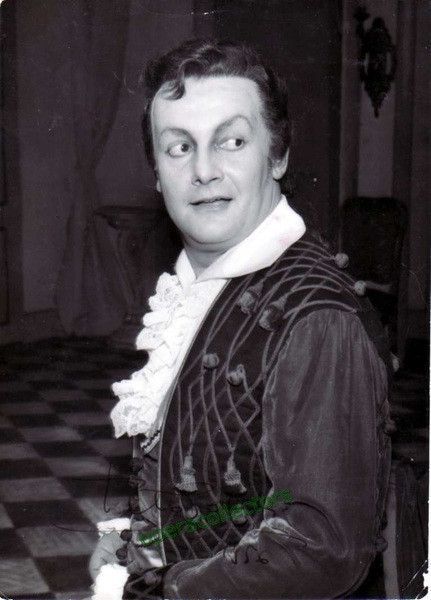
Hermann Prey hugged to Mirella Freni as his Susanna
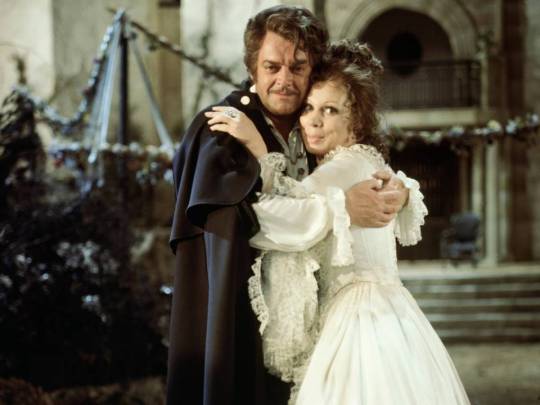
Ferrucio Furlanetto
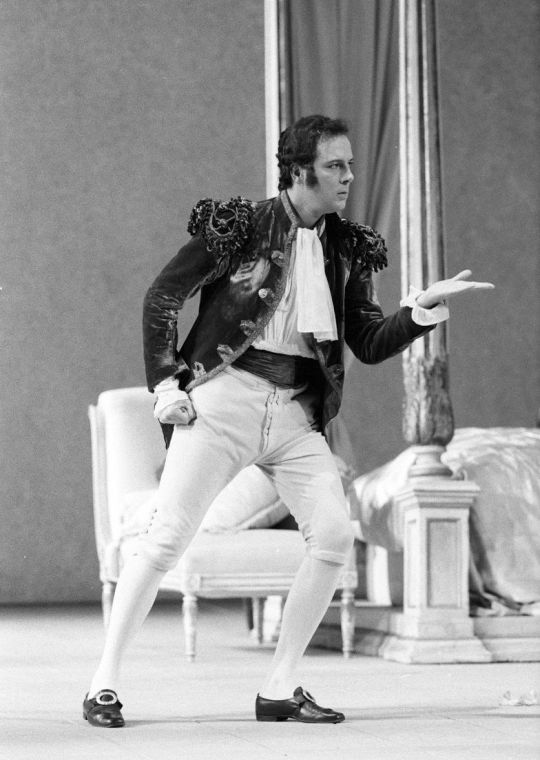
And two pics of my definitive face and voice of Figaro, Bryn Terfel, one alone and another with soprano Dawn Upshaw as Susanna

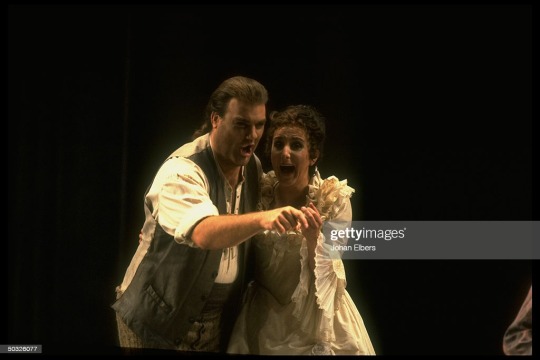
#barber of seville#the marriage of figaro#le nozze di figaro#gioachino rossini#wolfgang amadeus mozart#opera#theater#literature#classical music#fictional character ask#character ask meme#princesssarisa
13 notes
·
View notes
Text
Why 2HA adaptation might not be as bad as we think...
Okay so BL novel “The Husky and His White Cat Shizun” (chinese title: “二哈和他的白猫师尊”) aka 2HA is getting a live adaption which will be called “Immortality” (“皓衣行”). I know that usually, fans of original works are less than excited about this kinds of news and with good reasons. The issue is that those who buy the IP rights to a novel simply see its popularity and think that they can profit off of it without actually trying to understand the reason behind its popularity. Too often, BL fans see themselves forced to endure any of the following: 1) sex change of one of the male leads, 2) creation of a random female love interest, 3) turning a happy end into a bad end, 4) adding a bunch of scenes unrelated to our main pair that ends up dragging the series, 5) turning romance into brotherly affection... the list goes on and on. Sometimes, companies think that as long as they film any two guys together and sell a bit of physical touching here and there, fans will jump on it like rabid dogs which... is kinda stupid because, y’know, we have eyes (and standards) too.
So obviously, with the unprecedented popularity that came with the release of The Untamed, even more producers are starting to see the potential of danmei (BL) novels and with it came an onslaught of IP rights being bought and adapted. The list is pretty extensive, with some big names that I’m sure anyone who’s even slightly in the Chinese BL novel community has heard of before. Of course, included in that list, with the casting for the leads done and filming underway, is 2HA.
Quick overview of the story for those of you that don’t know: the story is set in the POV of the “gong” (top), a character named Mo Ran (also known as Mo Weiyu) who is the disciple of Chu Wanning, the “shou” (bottom) of our story. In his original life, Mo Ran had become the Emperor of the cultivation world through slaughter and tyranny, with the only one ever coming close to stopping him being his shizun, Chu Wanning, who eventually lost his life trying to stop him. After achieving the top by committing pretty much all crimes and sins known to men, weary and tired, Mo Ran decides to take his own life and ends it all. Unexpectedly, instead of dying and going to Hell, he transmigrated to the first year he became a disciple. As a thirty-something man in the body of a teen, he decides to do things right this time around and save the one he couldn’t save the first time around. As he goes through life a second time, truth after truths reveal themselves, with the biggest surprise being that the Shizun he hated so much in his previous life, and who Mo Ran thought hated/scorned him, actually turned out to be protecting him the entire time.
Mo Ran, in his past life, was powerful, cruel, merciless and arrogant. There was nothing he could not obtain and he knew it. He was cynical, had a very jaded view of the world and was kind of unstable (lots of mood swings and temper tantrums). After his rebirth, he still maintained some of the arrogance and cynicism, but is more mischievous, confident and cheeky. He is very much like a husky, looks kind of scary and big, but can be extremely loyal to the ones he recognizes and can be a bit dumb sometimes. Chu Wanning on the other hand, is an unflappable person with a frost-like exterior, but a heart of gold. Basically, he cares a lot but it’s easier for him to look like he doesn’t than to voice his feelings. He gets embarrassed easily and covers his embarrassment using anger. He is extremely strong, likes peace and quiet, and always abides by the rules.
Their relationship is kind of complicated. Initially, Mo Ran was in love with a fellow disciple called Shi Mei (despite the word meaning junior female disciple in Chinese, it’s actually the name of a male character). In the original timeline, Shi Mei died and that was the start of Mo Ran’s decline. After his rebirth, Mo Ran decides that he will do everything in his power to prevent Shi Mei from dying again. Don’t be mistaken though, Shi Mei is NOT the male lead. You’ll see as you read more that despite being in love with Shi Mei, Mo Ran is pretty obsessed with Chu Wanning because their relationship was kind of... complicated in the original timeline.
This is pretty much the premise for the story, but do be warned that it goes much deeper and darker than what you might expect (it’s rated R-18 for a reason). So why exactly am I writing all of this? To put it simply, I just kind of want to hype up the series and its adaptation a little, or at least, pique enough interest to give the live action adaptation a chance. Not gonna lie, when I heard 2HA was getting adapted, I was pretty skeptical because how. Mo Ran and Chu Wanning had a pretty physical relationship in the pre-rebirth timeline and that’s partially where the obsession that Mo Ran feels towards Chu Wanning stems from. There’s just basically a lot of unresolved sexual tension between them throughout the novel that I simply couldn’t see getting adapted. However, after thinking about it and reevaluating things from a low-expectations-standpoint, I think it might actually be possible to film something close enough to the original work. Here are some of the factors that influenced my opinion:
First, the series is set to air for 50 episodes (just like The Untamed). Why is the number of episodes important? Because it will determine how closely the adaptation will follow the original story and how much random stuff they can fit into it. Let’s take a step back and evaluate: 2HA’s novel has 311 chapters + extras while MDZS has 113 + extras. Obviously, people might have an issue with the number of episodes (”How are you going to air the same amount of episodes for a series that’s thrice as long??”) but I think it’s a good amount. Why? Because it pretty much guarantees a solid pacing that’ll keep the story moving forward without stagnating. I don’t think there is too much to worry in terms of too much source material being cut because quite a few chapters are R-18/romantic lining scenes that would not have gotten adapted anyways. Once those get deleted, I think 50 episodes is an acceptable amount.
Second, the entire production seems to be solid. The rights were actually bought by Tencent who, if you forgot, was also responsible for The Untamed. With prior success, I believe that they now have a pretty solid idea of how things should be run. Also, the CGI and world-design team is the same one as for Ashes of Love, which has me pretty stoked because while CG in chinese dramas has always been a hit or miss, Ashes of Love is definitely amongst some of the best I’ve seen (see below for examples). (P.S. there are also rumours that Lin Hai, the one responsible for The Untamed’s OST, might be working on 2HA but this is mere speculation at this point.) Overall, 2HA is looking to be like the most high-profile and expensive BL adaption yet.

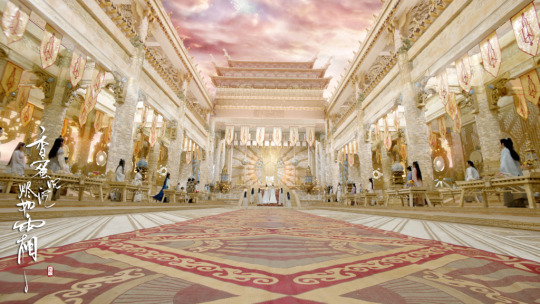
Third and finally, the casting.
Holy.
Okay.
This is what has me the most hyped.
Let’s start with Shi Mei, who will be portrayed by actress Chen Yao (or Sebrina Chen).

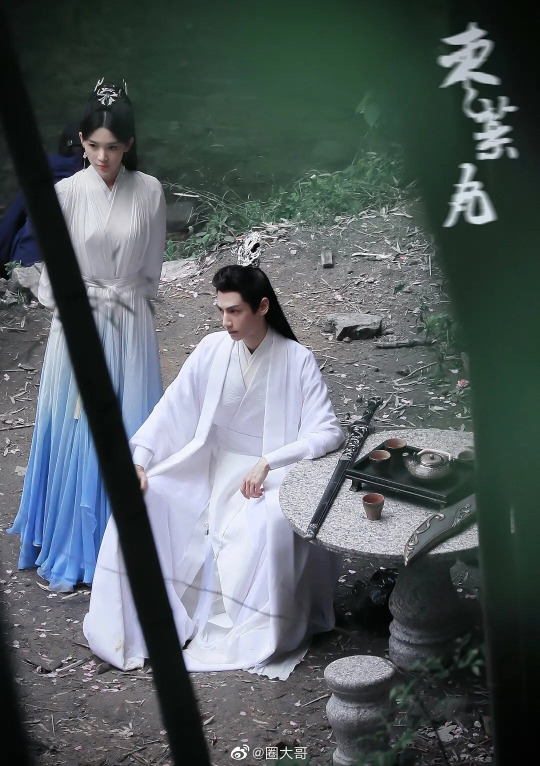
I know I’ve said that despite the name, Shi Mei is a male. As it turns out, likely for censorship reasons, “Immortality” could not escape from the clutches of the dreaded sex change so they went ahead and turned him into a girl. While not ideal, in my opinion, it actually works out pretty nicely here. In this case, it means that Mo Ran is in love with a female character which would further draw censorship’s attention away from the fact that Mo Ran really has a thing for his beautiful shizun. While it would have been perfect if everything could go according to source material, the fact that it’s Shi Mei that went through a sex change actually works pretty favourably in the grand scheme of things. Not to mention the actress set to play Shi Mei has some good experience acting similar roles so overall, I say that I trust her.
Next, we have Chu Wanning who will be played by Luo Yunxi (or Leo Luo).
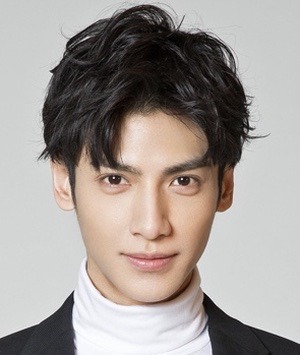
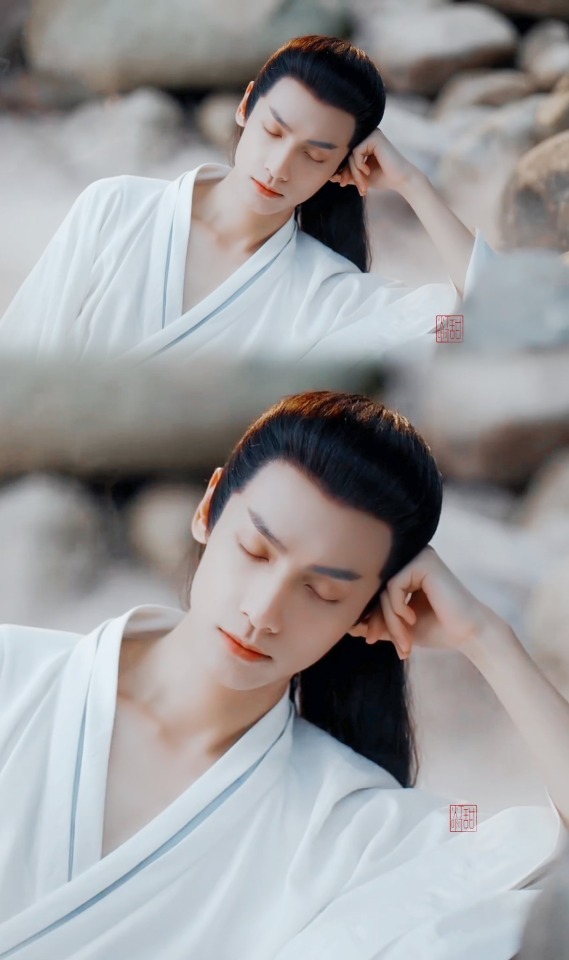
For this character, I have no worries whatsoever. If you’re unfamiliar with this actor, I highly recommend you give Ashes of Love a try. He played the 2nd lead and ugh. He’s so good at playing beautiful and elegant characters that are forced to undergo a ton of suffering and pain. Luo Yunxi used to be a professional ballet dancer so he moves with grace and his fight scenes are amazing to watch. Also, he has great control over his facial expressions. He’s able to act out characters that suffer a lot without making them seem weak or powerless. Even the way he cries can be considered both beautiful and heartbreaking.
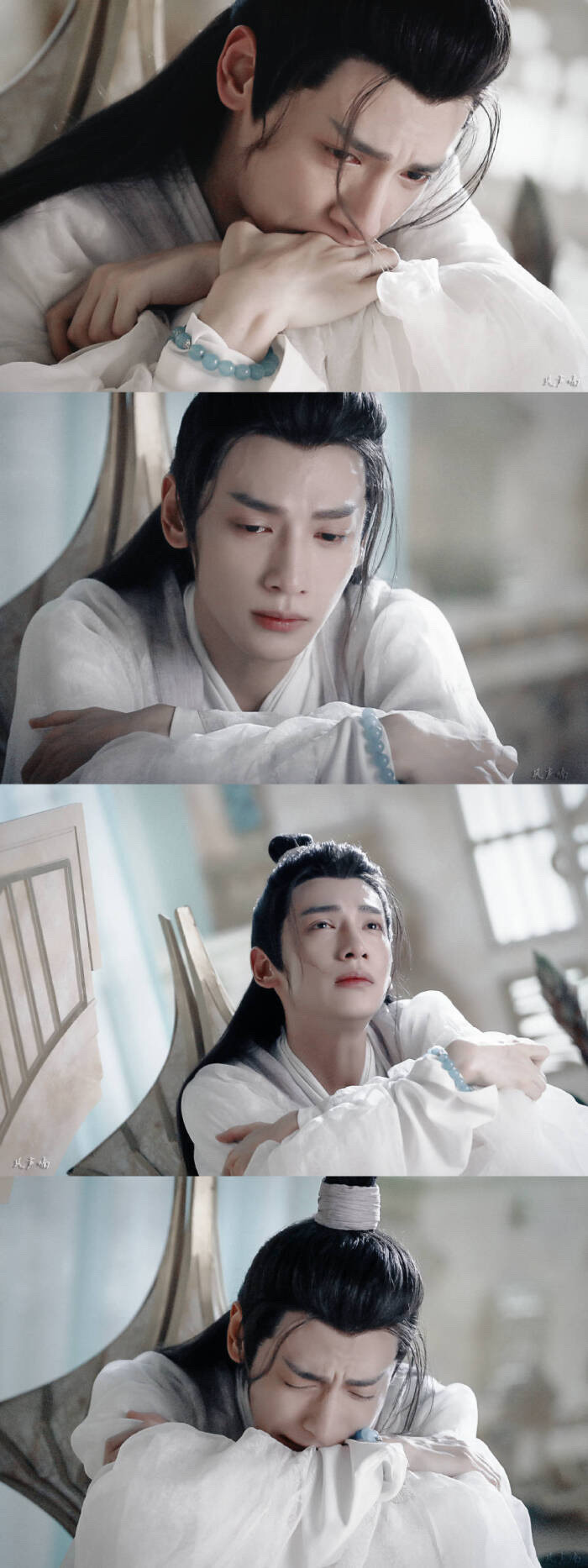
Finally, we have Mo Ran who will be portrayed by Chen Feiyu (or Arthur Chen).
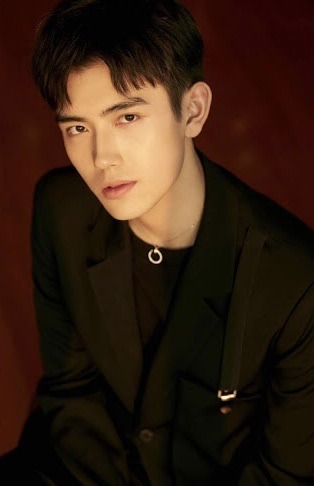
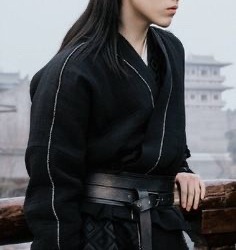
Mo Ran is an extremely complex character. From pre-rebirth’s insanity and arrogance, to post-rebirth’s hope and reservation, to post-revelation’s love and devotion, the actor’s going to have a lot on his plate. Originally, when I first googled him, I thought that while he’d manage to pull off post-rebirth teen!Mo Ran fairly well given how clean and refreshing his face looks, he’d have a harder time pulling off pre-rebirth’s arrogance, craziness and general “hardness”. However, after seeing some costume designs and makeup edits, I think that the boy might just pull it off. Also, while the actor is nowhere near as solid as Luo Yunxi is, it seems that he’s willing to put in extra time and effort (as seen by his Weibo post about how he’d been studying the source material) to make up for it. I think that with enough dedication, he might just be able to pull it off.
(Psssst! By the way, keeping this strictly between you and me, another reason why I’m such a fan of this pair is because of the height difference. I mean just look at this?? Their height difference is pretty much bang on with the novel height difference after Mo Ran grew past Chu Wanning’s height. Not to mention, don’t tell me you see this and don’t automatically picture a the big dorky puppy following his reserved and cool master around?)
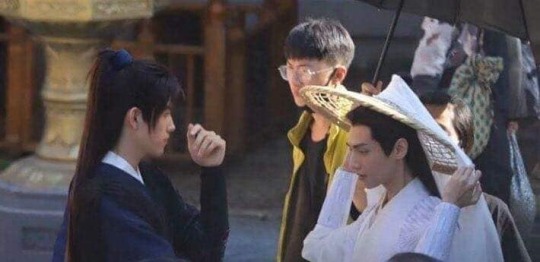
So yeah, all of this just to say that it might be okay to kind of have some expectations for 2HA. I really want to keep my own expectations down as low as possible given the amount of times we’ve been burned but I want to remain hopeful that, with the success of The Untamed, it can pave the way for better and more faithful danmei adaptations, with 2HA being one of them.
#the husky and his white cat shizun#二哈和他的白猫师尊#2ha#immortality#皓衣行#haoyixing#luo yunxi#chen feiyu#chen yao#leo luo#arthur chen#sebrina chen#chu wanning#mo ran#mo weiyu#long post#talking with zb
433 notes
·
View notes
Text
THOTS ON SHADOW AND BONE
Hello everyone! it is I, Trice, and i come with my thoughts on the Shadow and Bone show cause ive got many
I'm gonna divide this in what i liked, what i disliked, and what i think could have been better but didn't really bother me. Feel free to send your opinions too!
As a whole, I really liked the show and I think it's a great adaptation that both fans and newcomers will enjoy. It's super well done! and every episode had me glued to the tv even though I knew what was going to happen.
Beware this is long
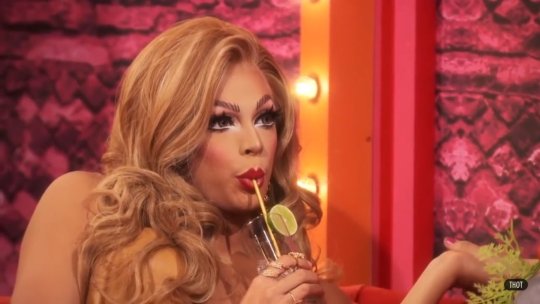
To start,
What i liked
Mal and Alina
I never really liked Mal in the books, mainly cause he had like, nothing going on for him, and not having his pov made him no favors whatsoever. Alina's perception of him was everychanging, two factors that didn't make him unlikeable necessarily, but that made me not want to read about him. In the show he's way more likeable and even though he still doesn't have a lot going on for him, you can see that he's always trying to protect alina, and you also see a bit of his demeanor through Archie's acting. I think he made a great job at portraying him. And Alina! Alina who in the books was essentially a y/n sort of character (although she did get better over time), her character, likes, dislikes, her DRIVE was incredibly portrayed in the show. Also Jessie (loml, marry me) and Archie have incredible chemistry together and they sold their yearning SO WELL (and so did the kid actors portraying them as children oh my GOD)...yall...i cried when they held hands. My favourite scene was definitely when Alina took care of Mal's wounds (a favorite trope of mine). And the HURT in their eyes whenever they thought the other was in danger....i saw the show dubbed but I'm sure their voices made it beyond incredible as well, their face acting was just on. point. Overall the show rEALLY makes me root for them both individually and together which is something the books didn't manage to do.
The Darkling
AAAAA i really enjoyed the Darkling omg, incredible charisma, Ben does such a great job (and so did his voice actor in Spanish oh my GOD). His acting was just as I imagined it in the books and i loved how he could be as sweet and mysterious as he could be menacing. In fact! i liked him more than i did in the book, and i think it was a great choice to make him more human. I'm not sure if this was Ben or the writing, but i could really see his yearning for an equal, for Alina, his loneliness and his thirst for power and control too. Great love interest, even greater villain. And his wardrobe was phenomenal. I also really liked how they implied that The Darkling was a name given by other people, it was very believable that people would call someone who literally controls shade something akin to "son of the dark" or something of the sort, instead of it being a name he gives himself or his job title (both if which are incredibly pathetic and cringy to think about).
Jesper
No comments. He was just great. I love Kit.
Nina
Omg Danielle did SUCH a great job at portraying Nina, it's exactly how i imagined her in Six of Crows.
Helnik
THE. YEARNING. THE. CHEMISTRY. I didn't love their scenes at the boat but once that was over I was practically screaming at the screen to jUST KISS ALREADY. Calahan and Daniell have such good chemistry together and the few changes they made only served the story better. I did wish they had development over more time cause Matthias' change of mind felt too quick, but i get why they had to rush. Because of how good their chemistry was, their fallout also was incredibly painful.
Inej's fear of the Menagerie and her morals
Amita's portrayal of Inej's hurt, devotion and her refusal to kill (and later hurt cause she has killed) is incredibly subtle but so SO effective. She's so talented really and truly sold Inej's feelings throughout the show.
VFX
Man.....the fold, the volcra, the grisha powers.....kudos to the animators and overall artistic team cause they were incredible. Also seeing the different title animations in each episode was such a tiny detail that made me so excited and they all looked so good.
Ketterdam
Again, kudos to the artistic team, everything about Ketterdam felt so alive (and weirdly moist), truly sold a kind of aesthetic and life that is so characteristic if the Barrel, even when i didn't imagine it that way in the books.
David
He appeared like, twice, and both times were so cute and charming I can't wait to see more of him both on his own and with Genya.
The Wardrobe
So, at first i hated the keftas. I thought the looked tacky and costume, but when you see them on screen they're just perfect (although i have to say the patterns on some of the keftas were kind of...cheap looking? and the training keftas were just kinda boring. My favourite was the Darkling's. Aside from that, i really liked Kaz's and inej's clothes too. Very distinctive and recognizable (although it was kind of weird seeing Inej in teal instead of purple lmao).
And the queen's dresses. Chefs kiss.
It's...so cheesy (affectionate)
The whole show felt like the kind of movies I would watch as a kid like Harry Potter and Pirates of the Caribbean. The writing was stylized enough to make it incredibly dramatic and overall there was just so much heart behind all of it. Definetely a show to watch again and again and feel all of it, cause that's what it being so cheesy managed, to make me actually feel for it. It feels like something to watch on a rainy afternoon after a bad day....it's great okay i really enjoyed it, even (specially) the most unbelievable parts of it. And here's the thing, it's something that i think a lot of newer tv and film have lost, so this is good.
What i didn't like
Zoya
Mostly cause of the writing. Originally, in the first book, i didn't like her, neither as a character (stereotypical mean girl with no other motivation than to bang the love interests....all three of them....what's new i still think it's an incredibly sexist trope) or a person (hey at least this was intentional), but over time i grew to LOVE her (mean girl turns out to have a good heart and actually respects the mc and decides to fight alongside her cause it's what's right, without necessarily liking her or giving up her character??? AND she has strong motivations??? now THAT'S new). In the show, i hoped they would keep her mean girl nature while foreshadowing her depth, but all they did was turn her into a petty seductress with barely any screentime, and that only makes her not even a bad antagonist but just a boring character to watch. Not only that but they took away a big part of her character that needed to be developed in the next books. I wanted to watch her rivalry with Alina, her unjustified venomous tongue too, I wanted to be entertained by her and I wasn't. This was also a problem cause when she finally changed teams, and when she hugged Alina, it was incredibly unsatisfying, it would have had a way stronger effect if we had seen her being Ruthless Zoya with a big ambition. I also didn't like how we were told that she didn't like alina, or that she had a family, instead of it being shown on screen. Just from the show, all i can tell you about her is that she likes to bang people and she has a good moral code i guess. Yall, I'm so petty about this.
Kaz
So, I didn't hate him, in fact i think I would have enjoyed him if I hadn't read the books first, cause the two things that bother me about him were two essential characteristics of him in the books. FIrstly, he seems so strained, instead of the seemingly laid back, almost chill looking (even though we know he's not chill at all) Kaz we see in the books, the Kaz that always knows something that you don't. Show Kaz doesn't seem to always be in control, to always have the last word, the last laugh. Instead he seems strained, all the damn time. And I think this is mainly a writing and directing issue. And he also seems weak, something Book Kaz would never do. This is also an issue cause because he doesn't have the same presence he has in the books, the times where he is weak, don't seem as effective. Sure, Pekka Rollins has essentially reduced him and humiliated him, but I haven't seen enough of Kaz being actually dangerous for this to be shocking and for Pekka to seem even more hateable (and, i really liked Pekka, loved him as an antagonist more than i did in the books). Idk, Kaz was so charismatic and just fun and engaging to read in the books that his portrayal in the show felt lacking.
Alina's power's VFX
The little suns were cute and all but the light coming from within her was just ugly I'm sorry.
SFX
A lot of the sound design was just too stylized for the tone of the show i think. I particularly remember the sound of Mal's punches....what's that about.
What i think could have been better, but didn't particularly dislike
The Crows' storyline
And i think part of this is a consequence of Kaz not being as witty as he was in the books. Where's the incredibly complicated heist moves? the even more unbelievable C and D plans when something goes wrong? I didn't like that them getting Alina was essentially just luck, cause i didn't see enough of them being smart and quick on their feet. I also think it was unnecessary to have their storyline mixed with Alina's, i would have enjoyed watching a different heist, maybe in Ravka as well, and them incidentally crossing paths with Alina, more than i liked this storyline. ironically enough, the heist was the part i was least interested in
Genya and Alina
I just feel like her relationship with Alina wasn't strong enough, and i think it's because the show tried to make us believe they were much closer than they were without spending the necessary time in them.
Overall, I really really enjoyed the show, i will be watching it again (particularly cause i want to watch it in English) and i cannot wait for the second season omg (although i have to say, I'm scared for Nikolai)
I think that's all! I would also love to read yall's opinions and have a conversation.

#Shadow and Bone#Shadow and Bone spoilers#sab#sab spoilers#grishaverse#the grisha trilogy#six of crows#malina#helnik#shadow and bone series#sab review
18 notes
·
View notes